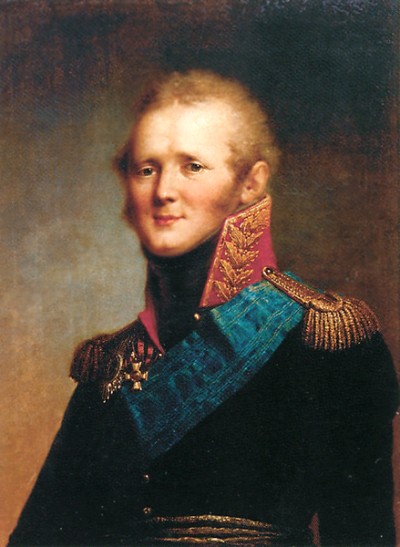 |
Tsar Alexander
IAt
the time of
Paul's assassination, his son was actually in the palace. Surely
Alexander, 23, heard the piteous screams
of his father being stabbed to death.
As Nicholas Zubov, one
of the assassins, made his way out of the castle, he saw Alexander
standing there pale as a ghost. Alexander knew just what had just happened.
The general said, "Okay,
boy, you're the Tsar now. Time to grow up! Go and rule!"
Was Alexander
involved in his father's death? Probably, but not in the
murder. Few facts exist. Count Pahlen,
one of the conspirators, used his position to destroy many documents that could
have shed more light on the details.
The best guess of the historians is that
Alexander gave his consent to the coup, but stipulated it could take
place only on the strict condition that his father's life be spared. Obviously
he trusted the wrong people to do his dirty work.
...Oops!
Hey, sorry, kid, but we got drunk and accidentally killed your dad.
Too bad, but it was his own fault for not doing what we told him
to do...
Unlike his predecessors, Peter the Great
and Catherine the Great, Alexander had a weakness known as a
conscience. He had just been a party to his father's own
murder.
Why Alexander agreed to
allow it to happen is the million dollar mystery. By all
accounts, Alexander was one of the most principled and spiritual men
to ever ascend to the Russian throne. Furthermore, his father had not
been mean or evil to Alexander. Nor did Alexander seem
power-hungry. Without a clear motive, this situation remains a riddle.
|
Gaining Tsardom through this hideous crime
surely created some nightmares. Knowing he had a hand in his
father's death instilled a remorse in Alexander that would linger for
the rest of his life.
Apparently nobody bothered
to tell Paul's wife Maria Feodorovna what
was going on. Shortly after her husband's
assassination, Maria Feodorovna remembered how
Catherine the Great had succeeded her own
murdered husband Peter III. The next morning Madame Feodorvna tried to
proclaim herself Empress. The conspirators
told Alexander to set her straight.
It took Maria's son, Alexander I, several
days to persuade her to relinquish her reckless claim.
"Gee,
Mom, they killed Dad so that I could be the
ruler, not you."
That's when Maria
Feodorovna figured it out. For some time afterward, whenever her son
Alexander came to visit, the Dowager
Empress would place a casket between them containing the
bloodstained nightshirt that Paul was wearing on the
night of the
murder.
Eventually the
strained relationship between mother and son improved.
Since his mother Maria Feodorovna
was only forty-two years old when she became a widow,
Alexander made sure his mother kept the
highest female position at court. From this point
on, his wife Louise was forced to appear after her mother-in-law at
all public events. Of course Louise didn't care for this
arrangement, but she accepted it.
The Early
Years
Considered by many to be
a sensitive soul, Alexander began his rule in 1801 with many lofty principles
and ideals. Growing up at the feet of his illustrious
grandmother, Alexander was Catherine the Great's hand-picked
successor. The Golden Prince had received more training in advance
of his role than any previous Tsar other than Peter the Great.
It had been 5 years since Catherine died and now he was ready.
The country was very excited at the prospects of
Alexander's reign; there were great hopes for the future of Russia
and the anticipation of a more liberal form of government and
increased freedom for serfs.
At first the Tsar did
little to discourage these aspirations. Alexander did everything he
could to act on his noble ideas. However, he soon discovered the hard way
that the nobility of Russia refused to cooperate unless they had no
choice. The Russian system allowed wealthy people to get much
wealthier while the majority of the population lived lives of
poverty and desperation. There was practically no such thing
as upward mobility. The nobles liked this system just fine.
To ask them to sacrifice for the good of the people was a concept
they could not even begin to conceive.
Catherine the Great had come up
against the same entrenched attitudes and hadn't gotten very far
either.
Paul had lost his life trying to change things. Peter the
Great was the only one to make any progress. If someone didn't
follow his orders, he just cut their head off.
Alexander was a little
too gentle to start lopping off heads. So he didn't see much
progress with his social reforms.
Frustrated and
demoralized, Alexander turned away from his childhood dreams and
principals. Increasingly he found it easier to get results by using
the power of autocracy. Once he began using autocratic power,
administered through men who served at his will, it corrupted him.
The longer he used this method of ruling Russia, the more difficult
it made it to return to the principals of good government he had
learned in his youth. Alexander turned cold and cynical.
However, very few people
remember much about Alexander's role in running the government.
Alexander is famous as the first man to ever stop Napoleon in his
tracks. The two men would go down in history as closely linked
adversaries.
|
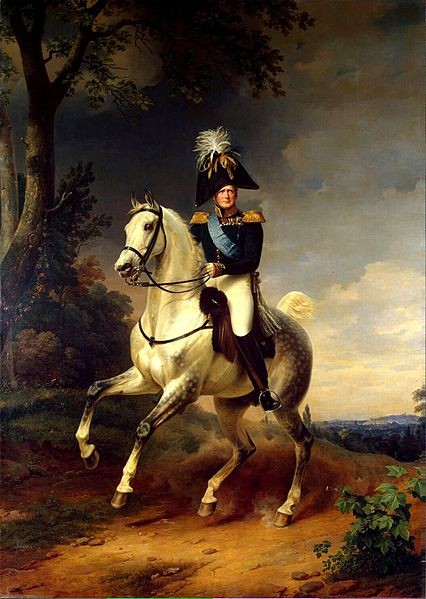 |
Napoleon and
Alexander
The underlying story of Alexander in regards
to the intimidating French dictator is how Alexander started out as a
weakling and grew to be a man... just as Zubov, the man who killed
his father... ordered him to. The highlight of Alexander's monarchy came
when he refused to knuckle under to the bullying tactics of Napoleon Bonaparte.
Alexander started out as
a friend of France. His French tutor La Harpe had instilled in
him a love for the principles of the French philosophers. In
addition, the language and the customs of the French played a
significant role in St. Petersburg society.
However, when Napoleon
began his conquests, Alexander became skeptical of Napoleon's
motives. In October 1801 Alexander dispatched La Harpe to
France to discuss common ground between the nations. For a
while it seemed as though France and Russia might come to an
understanding.
Carried away by the
enthusiasm of La Harpe, who had returned to Russia from Paris,
Alexander began to openly proclaim his admiration for French
institutions and for the genius of Napoleon Bonaparte, the man who
was turning France into a superpower.
However, after his next
visit to France, La Harpe warned Alexander that his opinion of
Napoleon had changed dramatically. He believed Napoleon was
quite likely a tyrant.
When Alexander learned of
Bonaparte's cold-blooded execution of the Duke of Enghien
on trumped up charges (1804), it became obvious to him that La Harpe was
correct. The Duke was an innocent man. Napoleon
simply wanted to get rid of the man. Bonaparte talked a good game,
but was a gangster at his core.
Alexander broke off relations with France and
entered into a coalition aligned against Bonaparte. Meanwhile
Napoleon was surprised. Russia could be very useful to him as
an ally. Napoleon never gave up hope of detaching Alexander from the
coalition.
|
Austerlitz 1807
In 1807 Napoleon took his
army to Austria. At the Battle of Austerlitz, the French badly
whipped the alliance of Prussian, Austrian and Russian forces.
Napoleon had no sooner
entered Vienna in triumph than he opened negotiations with
Alexander.
Russia and France,
Napoleon urged, were geographical allies. There was no true
conflict of interests. Russia could operate at one of end of
Europe, France could operate at the other end of Europe.
Their sphere of
operations could stay exclusive. Working together the two
countries might rule the world.
But Alexander was not
persuaded by Napoleon's offer to cut the world in half. Alexander preferred to
stick with his allies.
|
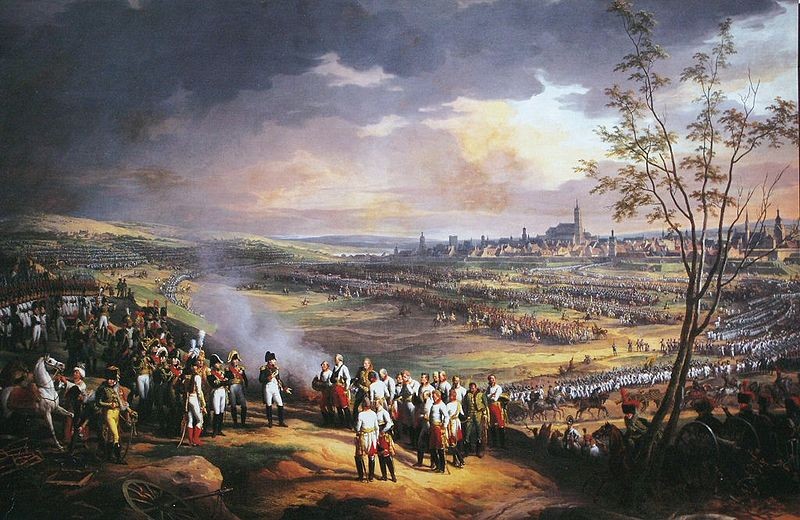 |
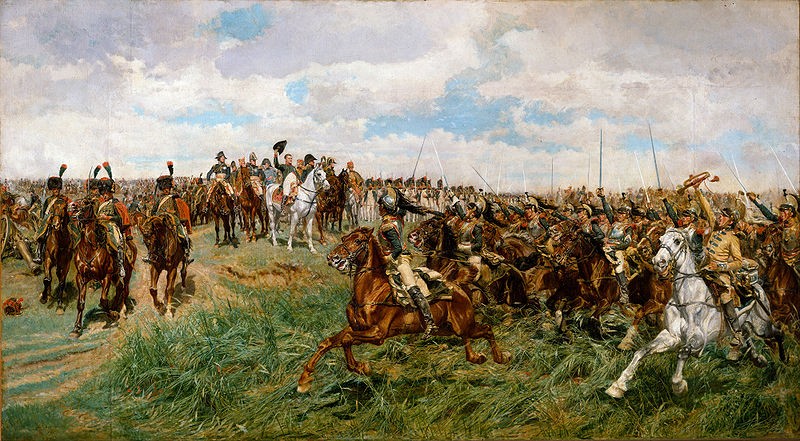 |
Friedland
1807
Once again Alexander
allied himself with the Kingdom of Prussia to take on the French war
machine.
Once again Alexander had
defeat rammed down his throat. He was learning the hard way
about France's military superiority.
The Battle of
Friedland (June 14, 1807) saw Napoleon I's French army decisively
defeat Count von Bennigsen's Russian army in
Friedland on the Polish-Russian border.
After the battle,
Napoleon saw another opportunity to turn the Russian Emperor.
Instead of demanding
punitive terms, he
invited Alexander to a private meeting.
|
Tilsit 1807
The two Emperors met at Tilsit
in June 1807. Napoleon
was only 8 years older.
Napoleon turned on the "big brother" charm. What kept these two
men from being personal friends? What stopped these two countries
from enjoying a partnership of glory? He offered
his alliance to the chastened autocrat for
the second time.
Napoleon knew just
how to appeal to the exuberant imagination of his new-found friend.
He would divide the world with Alexander.
Russia could have the Danube, Finland, and all of Turkey, India, and
any other Asian country he wanted.
Alexander, dazzled by Napoleon's genius and
overwhelmed by his apparent generosity, was completely won over.
His
anti-French feelings were changed at the personal meeting with
Bonaparte. Alexander agreed to partner with
France.
The agreement paid
immediate dividends for France. The
Continental System was a
large-scale embargo against British trade which began
in November 1806.
|
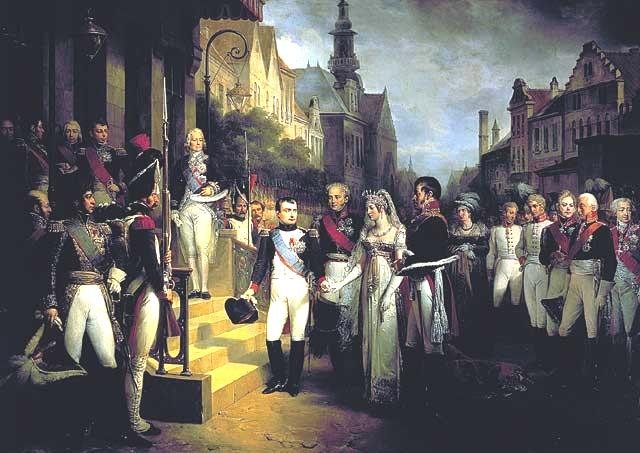 |
England was France's
greatest enemy.
Protected by the North
Sea, the greatest moat in history, invasion of the island of Great
Britain was out of the question. The only way France could
attack England was by breaking it economically.
|
So the France had a rule
- trade with England was forbidden.
Any country that
broke the rule could expect to be attacked. Since France occupied
almost all of Europe, few countries had the guts to oppose France.
Napoleon wasn't kidding. When Portugal resisted, Napoleon
immediately invaded the country. Napoleon understood that the
blockade of England was useless without total compliance.
This alliance with
Russia was important to France. All that remained to complete his
"Continental System"–a unilateral European blockade designed to
economically isolate Britain and force its subjugation–was the
cooperation of Russia.
After the Tilsit
agreement, Russia acted as France's ally against England. When Sweden,
Britain's ally, refused to comply with French demands, it was
invaded by Russia in February 1808 in accordance with the Tilsit
agreements. Napoleon was pleased. His recruitment of
Russia was paying immediate dividends.
Napoleon was right.
If Alexander had accepted his role as junior partner and cooperated
closely with Napoleon's ambitions, the world today might be divided into
French West and Russia East.
However, there were two
things that kept it from working. Alexander did not share
Napoleon's ease at sending people to their death and Napoleon
didn't play well with others. If Napoleon had looked inside a little
deeper, he would have admitted he would never share the glory.
There was only room on this continent for one Emperor.
|
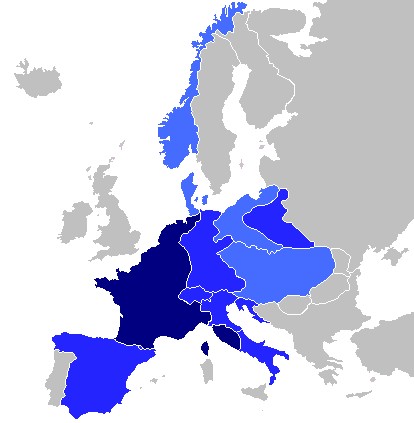
|
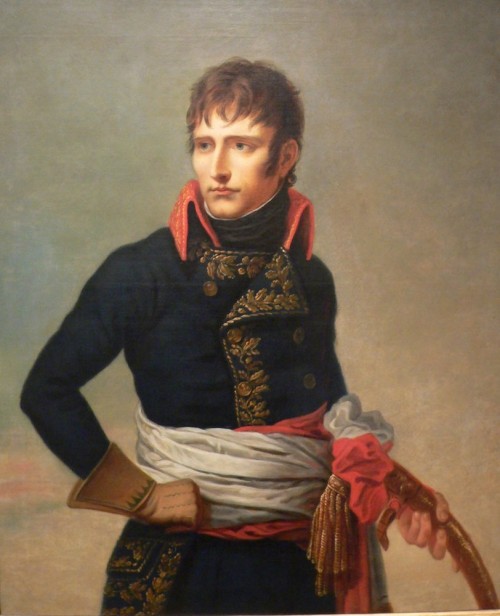 |
As the years
went by, Alexander grew increasingly suspicious of
Napoleon's motives. Napoleon had promised to let
Russia deal with the countries of the Danube such as Austria
and Prussia. However, rather than allow Russia to deal with
the countries of the Danube, French forces stayed in the
area. Russia maintained its alliance with France, but
Alexander grew ever more suspicious.
Franco-Russian relations became
progressively worse after 1810. Napoleon
was angry with Russia because he suspected that
Russia and
England had been trading secretly for some time. And
he was right. Before the war, England had been
Russia's main trading partner. Russia chafed under the
embargo and decided to begin trading again on the sly.
Meanwhile,
Napoleon continued to annex parts of Austria and Prussia.
Alexander began to entertain the idea that Napoleon was
playing him for a sucker. Contrary to the Napoleon's
promise of dividing the world into two spheres, Napoleon's
armies remained uncomfortably close to Russian borders.
By 1811, it became clear
that Napoleon was not keeping to his side of the terms of
the Treaty of Tilsit.
Meanwhile, this
Continental System was ruinous to the Russian economy. So,
in 1812, Russia broke the agreement of Tilsit and began to
trade openly with England. Napoleon was furious.
He moved his
army closer and closer to Russian borders.
When
Napoleon annexed a slice of Poland that Alexander had warned
him to leave alone, Alexander issued a blunt warning - back
off from Poland or expect retaliation.
No one talked to
Napoleon like that, especially a pipsqueak Tsar with a
third-rate army. Napoleon had increasingly come to view
Europe as his own domain. Napoleon didn't particularly
desire war with Russia, but his habit of subjecting every
country to his will was clearly leading to a conflict of the
Titans. France already had all the territory it needed
for its glory, but the Tsar's defiance intrigued him.
Someone needed to teach Alexander a lesson.
|
|
War With Russia
In 1812, French Emperor
Napoleon I was at the height of his fortunes. The Peninsular
War against Spain and Britain was a thorn in the side of his great European
empire, but he was confident that his generals would soon triumph in
Spain. Now Russia had just sided with England, his greatest
foe. Napoleon needed the continued cooperation of Russia to
economically isolate Britain and force its subjugation.
To intimidate Alexander
back into compliance, Napoleon massed his forces in Poland in the
spring of 1812 along the Russian border. Still the Tsar resisted.
In Dresden, Napoleon
invited his staff to discuss invading Russia. There was an
unusual amount of disagreement. There was only one man in the
room who thought it was a good idea.
Napoleon stood up and
asked for quiet. He began a speech about certain victory.
“Russia is a
semi-Asiatic nation which cannot field an army as large as your
own, and has no literature or music to speak of.
It is a barbarian
nation, and barbarians are superstitious and have simple ideas.
A single blow delivered at the heart of the Russian Empire, at
Moscow the Great, Moscow the Holy, will, in a single instant,
put this whole blind apathetic mass into despair.
Alexander will come back to me, just as he did at Friedland.”
Seeing that Napoleon had
his mind made up, there was no further dissent.
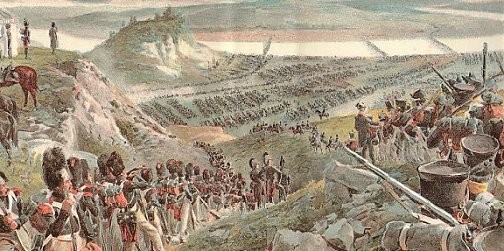 |
Napoleon's invasion of
Russia commenced on 24 June 1812 with the crossing of the Nieman
River which acted as the border between Russia and Poland. Napoleon had sent a final offer of
peace to Saint Petersburg shortly before commencing operations.
He never received a reply, so he gave the order to proceed into
Russian Poland.
This began one of the
most extraordinarily military campaigns in history. It certainly is
one of the most heavily analyzed. One reason for the intense
study is all the unanswered questions.
Napoleon never wrote
any memoirs commenting on his inner thoughts, so diplomats and war
strategists alike have tried to read his mind ever since.
|
Napoleon was still
waging war with Spain. Did he really want to take on two
fights at once?
Napoleon was taking a
huge risk invading this vast foreign country so far from home.
Defending the supply lines would be tricky. Furthermore, no matter how weak the military, it is never easy fighting desperate
people defending their home soil and families. Finally, the attack seemed
to have so little practical value. Yet Napoleon never
hesitated. Most historians have concluded
Napoleon's attack on Russia was more ego-driven. Napoleon
couldn't stand the thought that the Tsar was defying him.
Another conclusion is
that Napoleon based his decision on several factors that didn't pan
out. One, he assumed his army could live off the land just as
it had in every other country it had attacked. Two, he took
Alexander to be a coward. He expected Alexander would see his
armies being destroyed and panic. Alexander could never
stomach all the
destruction Napoleon's army was so famously capable of.
Napoleon fully expected Alexander to crumble at the first major
military loss and come rushing to the bargaining table.
Misjudging the Tsar was
Napoleon's biggest mistake. Alexander wasn't always a
practical man. There was a side to him that said this coming
battle was a struggle for the soul of mankind, good versus evil.
At some level, Alexander believed it was his sacred duty to God to
stop Napoleon no matter what the cost...
Refusing to be cowed by the appearance of
the French army on his borders in 1812,
Alexander showed remarkable strength of character.
Alexander famously spoke,
"If the
Emperor Napoleon is determined on war and if fortune does not
smile on our just cause, he will be forced to go to the end of
the world to find peace."
|
The
Secrets of Napoleon's Success
Napoleon had an
almost total disregard for the military power of Russia.
With a force
estimated at half a
million men, the Grande Armée
marched confidently through
Western Russia. "Within a month we
shall be in Moscow," announced
Napoleon
cheerfully. "Within six weeks, the Russians will sue for
peace."
Napoleon
initially met little resistance. The French won
a series of
early engagements
and moved quickly into the enemy's
territory. Napoleon wanted to be in Moscow in one month.
He might get there sooner at this rate. Some of his
generals had completely disagreed with his decision to enter
Russia, but Napoleon wasn't worried. For many years
now he had beaten far more formidable armies than the
disorganized Russians. Napoleon had won these battles
through superior military strategy.
|
It
had all started
with a brilliant new
philosophy -
speed and
maneuverability.
Napoleon got his
start by asking this question - how could he command
such a large group of people but still retain the
flexibility that he had with his smaller artillery units?
He took
the controversial approach of radically decentralizing his
command. He broke the army up into smaller divisions of men
commanded by field marshals. These marshals had nearly
complete autonomy as long as they followed the strategic
objectives outlined by Napoleon. The
marshals had permission to react to problems instantly.
Napoleon also introduced
a technical innovation into his
army
- the backpack. All of his soldiers carried 60 pound
packs that provided them with enough food and water for a
week. They were taught to live off the land by hunting and
foraging. This freed the soldiers
from the slow supply caravans and allowed them to remain
independent for long periods of time.
With smaller forces that did not need to be connected to the
supply lines, Napoleon was able to invent a new kind of
fighting - maneuver warfare.
While most
European generals were trained to develop complicated battle
plans in advance, Napoleon believed this was a waste of time
because no one could possibly predict every action of the
enemy in advance.
There was too much uncertainty inherent in every battle
situation. Victory depended on the ability to react
quickly to changing situations. By trusting all
decisions to be made by the
commanders who had the best perspective on the
field, Napoleon
gained a huge advantage over his competitors.
Entering Russia,
Napoleon had never lost a major campaign.
|
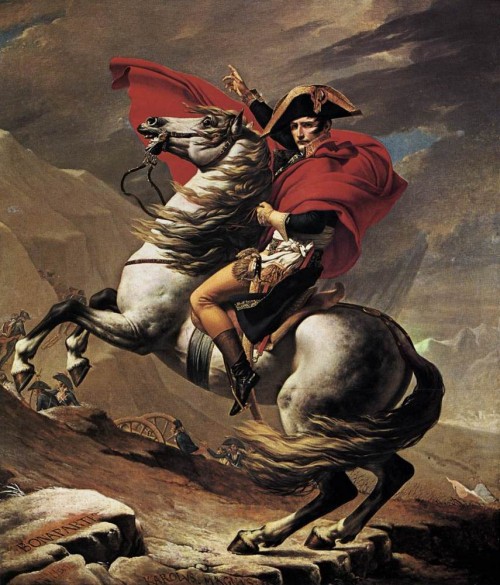 |
Napoleon's Confidence
Now that he was
in Russia, Napoleon was
impressed with himself.
He had
undertaken the greatest attack of his career - a 600 mile
trip across hostile, barren territory to Moscow. It
had never been done before. The Mongol Horde had
skipped Moscow because it was too far out of their way.
"Moscow is an outpost on the very distant edge of
civilization," Napoleon chuckled, "that is, assuming Russia
could be called a civilization."
Napoleon was
fascinated by the story of Charles XII of Sweden who had
failed miserably one hundred years earlier in 1709 in his
attempt to take Moscow. At every opportunity, Napoleon
amused himself by reading about Charles XII's foolish
invasion of Russia in pursuit of Peter the Great.
Charles had ultimately been beaten by Peter the Great's scorched
earth strategy and guerilla warfare.
Napoleon paid
attention. He was
well aware that he too was facing supply issues. After
all, he himself had once said, ‘An army travels on its
stomach.’ By this, he meant that the problem of
keeping an army supplied is a prerequisite for the very
existence of the force. Napoleon had taken extra
precautions to make sure his supply lines were intact.
As Napoleon
memorized every minute detail - geography, topography,
history, population, weather - it never seemed to dawn on him that the
same fate that Charles had faced might await his army as
well.
Closer and
closer to Moscow they come...
|
| |
|
Scorched Earth Strategy
|
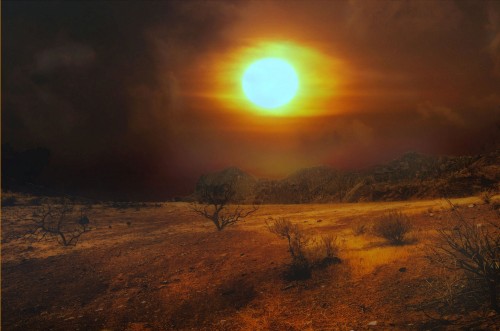 |
|
|
|
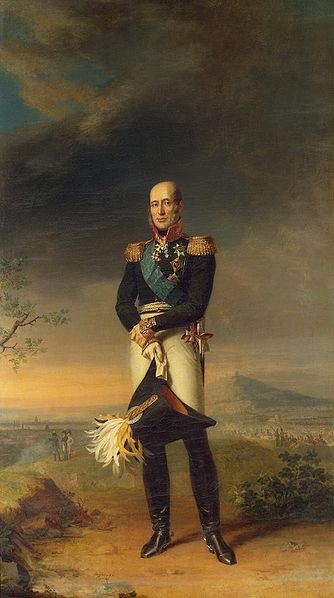 |
Barclay de
Tolly
The Russians were under
the command of Barclay de Tolly. Barclay was a
foreigner. He grew up speaking German in Livonia
(modern day Estonia).
Barclay had been a member of the Russian
Military since 1776 at the age of 15. Rising through the
ranks, he achieved great notoriety by taking Finland from Sweden in
1809 thanks to some brilliant maneuvers in a snowstorm. That
success earned him a promotion to Commander of the entire Russian
army.
Barclay had spent his
entire career studying Napoleon. Barclay had faced the military
genius in battle several times as commander of smaller units.
After the inevitable defeats, Barclay would try to figure out what
had gone wrong. As Barclay watched the European generals
lose one battle after another to this great disrupter, he looked for
weaknesses he could exploit.
As a member of the
Russian military, Barclay was quite familiar with the scorched earth
strategy Peter the Great had used to defeat Sweden's King Charles.
Could this work against Napoleon?
Barclay noted the
similarities of the two situations. Both Charles and Napoleon
had vastly superior armies. Both Charles and Napoleon were
very far from home.
Seeing the Russians
stood little chance of winning a head-to-head war, Barclay
proposed the now famous
Russian scorched earth strategy
against Napoleon. The Grande Armée
was so large it could practically form a ring around the Russian
army. Only a fool would engage such a vast force directly. Let the Russians constantly retreat.
By drawing the enemy deep into Russian
territory all the while burning crops to deprive them of
food and disrupting their supply lines, perhaps the Russians could starve the massive army to death.
The lead Russian command
consisted of Tsar Alexander, Prince Michael Barclay de Tolly, Prince
Pyotr Bagration and General Mikhail Kutuzov. These men talked
it over. They all shook their heads in consternation. No
one was quite sure Barclay's weird strategy would work. No one
liked it, that's for sure. It went against human nature which
of course is to resist force with force.
|
However, Barclay had
done his homework. He pointed out Napoleon's tendency to march
way ahead of the supply lines. He reminded them this strategy
had worked against Charles.
For good measure, he
reminded the men that
to engage the enemy directly would give the
French a
chance at a knock-out blow. It was
better to let them chase the Russian army across Russia and try to slowly
starve them to death.
Still the other generals
balked. Fortunately, Barclay had an ally. Karl Ludwig
von Phull was a German military strategist hired by Alexander
himself. Alexander had confidence in this man. When von
Phull wholeheartedly endorsed Barclay's plan, the die was cast.
Barclay got
permission to try his risky strategy.
Now as the giant French army
approached, Barclay played cat and mouse.
He would let the French get close, let the Cossacks conduct surprise
raids to slow down the approach, then retreat. Along the way
he would set his men to burn crops, burn homes, and always retreat
rather than to risk a major battle.
It wasn't easy. The Russian soldiers watched in horror as vast throngs of peasants
lost their homes and their food. Some peasants joined a huge migration to
the east; others chose to hide in the forests and let the French
pass by. Homeless, exposed to the cold and without food, the
death toll rose. The soldiers could barely stand the guilt as
their countrymen stared at them in hopeless confusion while they
destroyed crop after crop. These people were doomed.
This strategy revolted
the Russian generals as well. It might make sense on paper,
but it was painful to watch. This was Russian soil that this
foreigner Barclay was so blithely ceding to the French.
Furthermore, Napoleon's men weren't the only ones suffering.
Watching the Russian peasants starve to death right in front of
their eyes grated deeply on Russian sentiments.
Watching Napoleon move
deeper into Russian without opposition was equally terrifying.
What kind of defense was this? Why not stand up and fight like men?
|
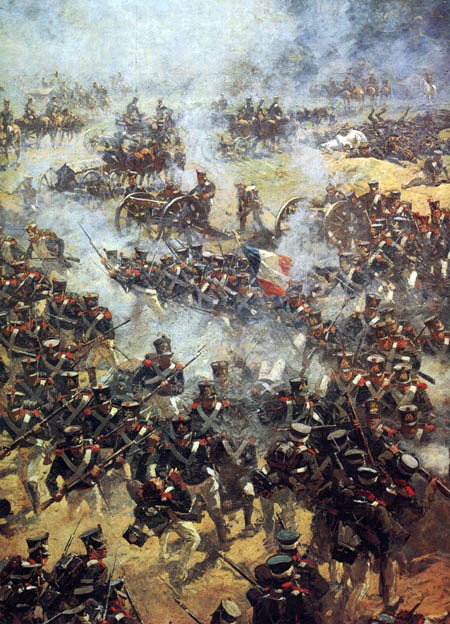 |
Barclay was a very
unpopular commander.
No one trusted Barclay enough to agree this
was the right approach. His rival
officers spread
rumors that he was secretly an agent of Napoleon. The Russians
had been keenly opposed the appointment of
a foreigner as commander-in-chief in the first
place. The terrified populace condemned Barclay
as a coward. Now, behind his back, the
other Russian generals seemed to agree.
Barclay refused to be
bullied into fighting Napoleon. He knew full well that to
engage Napoleon in an open battle like the disaster at Austerlitz
was to play right into Napoleon's strong point. The quick
maneuvers of the French in the open field would surely doom the
untrained Russian army to a devastating defeat.
The
other generals weren't the only ones who were worried.
Tsar Alexander was panic stricken at the swift advance of the French.
|
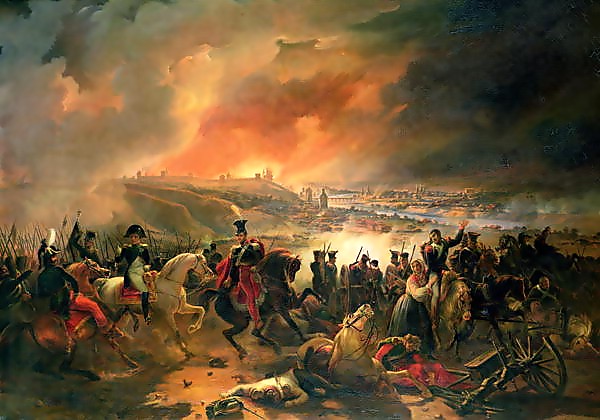 |
Smolensk
Barclay's chief
critic was Pyotr Bagration, commander of a large Russian
unit. Bagration and Barclay bickered constantly over
this passive defense. Despite heated arguments,
Barclay refused to fight despite Bagration's urgings.
Finally
Bagration couldn't take it any more. Whether it was
conflicting orders or a breakdown in communication, no one
is certain, but Bagration basically disobeyed orders.
Anticipating a French movement, Bagration raced to defend
Smolensk to the south. When Alexander learned of this
decision, he took Bagration's side. After watching the
torture of the Russian retreat for two months, Alexander
couldn't take it any more. He ordered Barclay to go
and reinforce Bagration.
Given no choice,
Barclay
joined his rival to engage
Napoleon at Smolensk.
On August
16, French forces found the city heavily garrisoned by
Bagration's troops, further reinforced with the subsequent
arrival of Barclay and the main Russian army.
|
It took three days, but in the end
Napoleon won handily. He forced
Barclay to retreat when he threatened Barclay's only escape
route.
For some reason,
the ignominious defeat was pinned on the unpopular Barclay.
The scorched earth policy had created a deep well of
resentment. Now the loss of
the Holy City of Smolensk brought the
anger to a boil. The outcry of officers and civilians
against Barclay grew to a point
where the Tsar could no longer ignore it.
Noting that
Bagration hadn't helped matters with his disobedience,
Alexander had only one other choice - Kutuzov, the old man.
Alexander
appointed
Mikhail Kutuzov as the
over-all commander of the Russian Forces. Barclay remained
on staff as General of the 1st
Army of the West.
Inwardly,
Alexander shuddered. He personally disliked Kutuzov.
Alexander was not only
repulsed by Kutuzov’s grossly fat
physique, he still irrationally held
him responsible for the stinging
defeat at Austerlitz five years earlier
at the hands of Napoleon.
Alexander didn't
have much confidence in the man, but
Kutuzov was a
popular choice with the men on several accounts. They
liked that Kutuzov was Russian-born.
Kutuzov had been around forever. He went all back to
the glory days of Alexander Suvarov, the legendary commander
in the days of Catherine the Great who had never lost a
single battle.
Alexander
shrugged. Kutuzov was the veteran of many campaigns.
Most recently he had put a swift end to a Turkish struggle
that had seemingly gone on forever. Kutuzov was definitely
experienced. Maybe fat Kutuzov would surprise him.
|
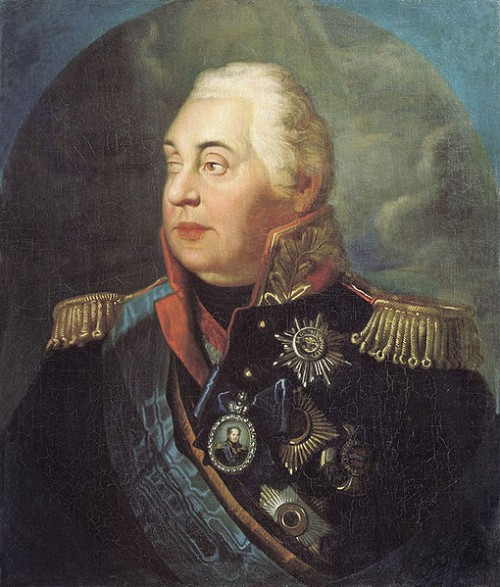 |
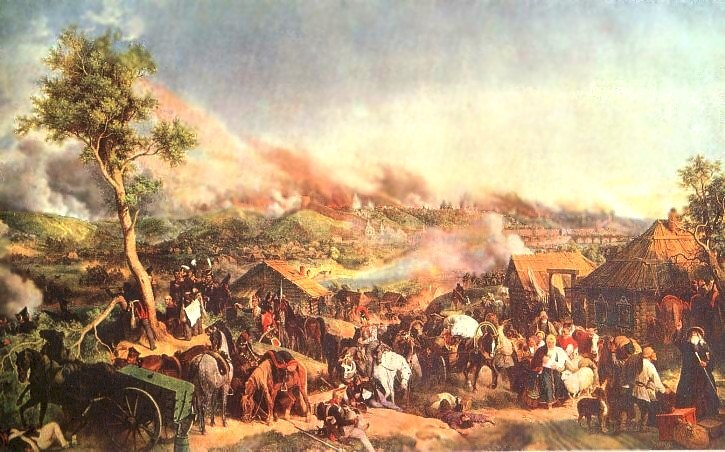 |
Slow
Death
No one in Russia
would have ever guessed it at the time, but Napoleon's victory at Smolensk was
the beginning of the end.
To save the army, Barclay de Tolly
abandoned the city destroying all ammunition stores and
bridges. Leaving a small force
behind to
cover his retreat, Barclay ordered
the unthinkable - he gave orders to burn the city.
By
nightfall, most of the city was burning.
Napoleon was
aghast. The Assumption Cathedral in Smolensk
was home to
one of the most venerated icons of the Orthodox Church
- Our
Lady of Smolensk attributed to St Luke.
Napoleon assumed that the Russians would fight
outside the city to avoid its destruction.
Now this ancient holy place was in flames never to be seen
again.
Napoleon viewed
the burning city with growing concern. What kind of people
was he dealing with?
|
This was not a new
feeling. For some time now,
Napoleon had dealt with the
gnawing feeling
that these Russians were crazy. They would destroy
anything to keep his army from eating. They were
sacrificing their own people in the process, but that didn't
stop them. Napoleon shuddered. He understood the
civilized people of Europe, but these people still had a
touch of Oriental barbarism. They were a strange
people indeed.
Technically the battle of Smolensk
was a victory for Napoleon as he captured the city. However
his soldiers were already running short of food and its
destruction denied him access to food
within the city. It also deprived him of a useful supply base, adding to the
logistics problems caused by the Russian scorched earth
tactics. Seeing Smolensk burn to
the ground was a bad omen.
Everything Starts to Go Wrong
Many of the
Napoleon's
usual
methods of operation worked against him. It was only
August, but it was already starting to snow. The lack
of winter horse shoes made it impossible for the horses to
obtain traction on snow. With the horses hampered, the
forced marches often made troops do without supplies as the
supply wagons struggled to keep up.
The lack of food
and water in the thinly populated, agriculturally-ruined
regions now led to the first cases of death by starvation in
the French army. It wasn't the men who died, but
rather the horses. The
snows made food for the horses difficult to find. Both
men and their mounts were exposed to waterborne diseases
from drinking from mud puddles and eating rotten food and
forage.
The loss of the horses make it harder to keep the supply
wagons moving. People assume that Napoleon was
completely ignorant to the supply problem, but that was not
the case.
Napoleon had in fact made extensive preparations providing
for the provisioning of his army. Seventeen train
battalions, comprising 6000 vehicles, were to provide a
40-day supply for the Grande Armée and its operations.
A
large system of magazines was established in towns and
cities in Poland and East Prussia stretching to the border
of Russia.
What most people
don't realize is that Napoleon never expected to go all the
way to Moscow. Napoleon's plan was simply to enter Russia,
beat the pants off the Russian army in the first engagement,
and let Alexander come crying to his tent begging for peace
and forgiveness.
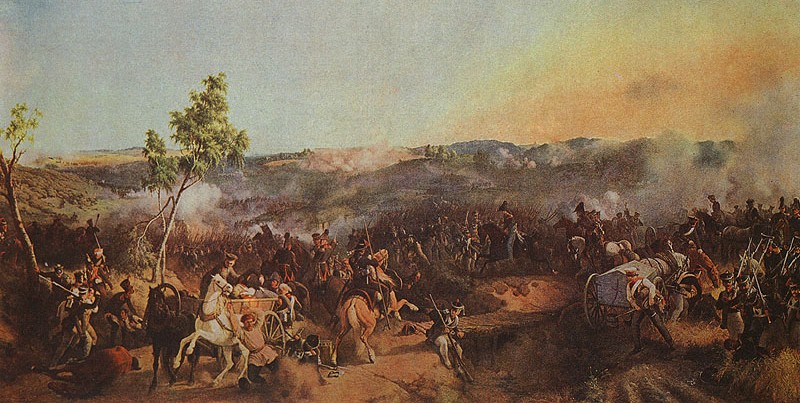 |
Therefore these
preparations would have sufficed. What Napoleon did
not anticipate was the refusal of the Russians to defend
their country. That surprised him... and angered him.
He fell for the bait. The retreat
of the Russian armies continued to lure the Grand Armée ever
deeper into Russia.
Now the French learned the hard way that
Russia had a poor infrastructure. Unlike the well-kept
roads of Europe, Russia's roads were pitiful dirt
paths.
The men,
wagons and horses were forced to travel narrow dirt roads
that would dissolve into deep mires with every rain.
The ruts in the mud caused untold problems, tripping already
exhausted horses and snapping wagon wheels.
|
The cold temperatures and lack of
available resources continued to take
their toll. Napoleon had
planned on scavenging for supplies to support his massive
army, but the Russians had destroyed all of their crops.
As a result, the army was heavily reliant on slow
supply trains from Europe that were unable to keep pace with
its quick advance. Common sense had
suggested taking this massive army into Russia worked to his
advantage, but now there were too many mouths to feed.
First it had been the horses, but now some of the men began
to die from
starvation and exposure.
Napoleon
grimly noted he had lost more men to hunger than battle. Nothing was
working as planned.
Then Napoleon got more bad news.
His attack on Saint Petersburg had just failed.
Russia was a
two-headed monster. It had a political capital in
Saint Petersburg and a cultural capital in Moscow.
From the start Napoleon wasn't sure which target made more
sense to attack. Moscow was his preference, but to
cover his bet he sent part of his army towards St.
Petersburg.
In a separate
battle on the same day as Smolensk,
the right wing of the Russian Army,
under the command of General Peter Wittgenstein, stopped
a wing of the French Army in the
Battle of Polotsk. This
prevented the French marching on the Russian capital at
Saint Petersburg. Napoleon frowned.
Had Saint Petersburg fallen, the war might have been over
right there.
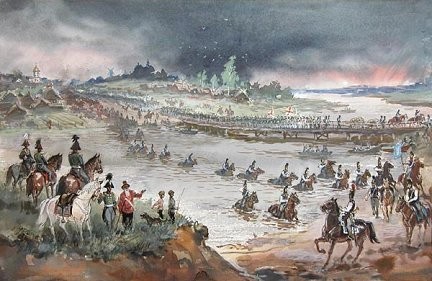 |
Now the
fate of the war had to be decided on the Moscow front.
Napoleon had a tough decision to make. His troops were
hungry. That damn Barclay was making things miserable.
Barclay was leading the French on a wild goose chase through
barren land. Barclay was burning crops. Barclay
was burning bridges and forcing delays. Napoleon
cursed. It seemed like the army faced another
major river every other day. Each day lost building
pontoons meant another day of hunger.
But the worst
news of all was that the Russians were now raiding his
supply trains from the rear. His army was so far
extended into Russia that the Cossacks had found weak links
far
behind the main body of men.
The harassment of
the smaller forces left behind to defend his supply
lines meant further delays in getting new supplies.
Napoleon
cursed at the knowledge that those damn Cossacks were dining
well on his army's food supplies. Those Cossack raids were
making life miserable.
|
Should
Napoleon
retreat or move forward?
Napoleon took a
long breath. One part of him wanted to cut his losses
and head home. He had two objections. First, he
knew the lands behind him held no food. A retreat
meant a month of marching through land that could not feed
him. Second, this would be seen as a humiliating
defeat in eyes of Europe. Every country currently
cowering under the threat of French invasion would be
tempted to rise up against him if he turned back now.
Moscow was only
230 miles away. At the usual pace of his nimble army,
he could be there in two to four weeks. There in Moscow he would find the food and
shelter his army needed. Moscow was the most populated
and important city in Russia. There could be no doubt the
Tsar would beg him to spare Moscow and surrender
unconditionally. The conquest of Moscow would
guarantee that his reputation would stay intact.
Knowing
Napoleon, there could be no doubt which choice he would
take. Napoleon was a gambler at heart who liked to
bet on himself.
|
|
|
The Road to Moscow
|
It was now late
August, two months since Napoleon had entered Russia.
Napoleon had expected to take Russia in a month; he was
already a month behind schedule with no end in sight.
Napoleon
fumed. The roads were in such terrible shape
that progress was molasses. Plus it left his
men sitting ducks to raids.
Unable to move with
any speed, the Cossacks, gypsy warriors on fast horses,
continued their guerilla-style attacks on the French flanks
and rear.
Alexander was
rallying the people. Napoleon's invasion had accomplished a
miracle - for the first time in history, the Russian people
were united.
Cries of
"Victory or Death" resounded throughout the country.
From every corner of the vast nation, patriotic volunteers
trudged towards Moscow to swell the ranks of Kutuzov's ragtag
army.
Russia
was preparing to make it's defense of Moscow.
|
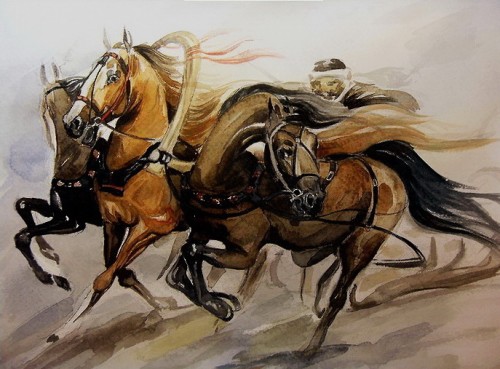 |
|
Bloody Borodino
Kutuzov had been quietly in
favor of Barclay's scorched earth tactics all along, but kept that
to himself. He knew better
than to incur the same wrath by letting it be known. He too
continued to retreat. However, as the French grew closer to Moscow, Alexander ordered Kutuzov to
take a stand. Scorched earth tactics and constant retreat be
damned. Alexander would not give up Moscow without a fight.
The fight took place
three weeks
after Smolensk. Kutuzov decided to
make his stand in a
series of rolling hills 70 miles west of Moscow.
|
The two giant
armies clashed at Borodino on 7
September 1812. The battle
involved a quarter of a million
soldiers. It was the greatest battle in human history
at
the time.
Napoleon was surprised
to meet a force almost as large as his own. The Russian spirit
had suddenly come to life! Countless Russians had come forward to
volunteer to fight. Many of them carried
little more than pitchforks, but they were ready to die if that's
what it took to defend Moscow.
And die they did. At the conclusion, the battlefield
was covered with the bodies of nearly 100,000 men.
Even the battle-hardened
Generals were shaken. It was difficult for them to comprehend this
massive loss of life.
One-third of the French
army and
half of the Russian army were killed or
wounded in the long hours of fierce hand to hand fighting.
As horrible as it
sounds, oddly
enough, these massive losses favored the Russians. They
could replace the fallen soldiers; the French could not.
The relative strength of the two armies was getting closer.
|
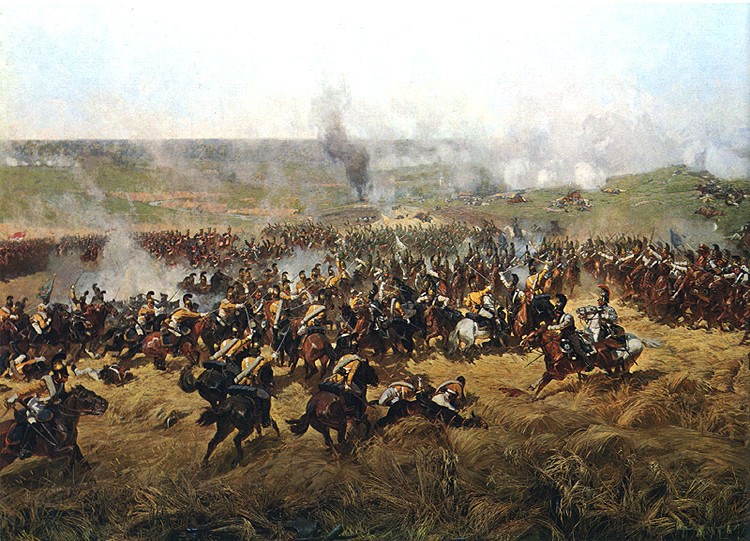 |
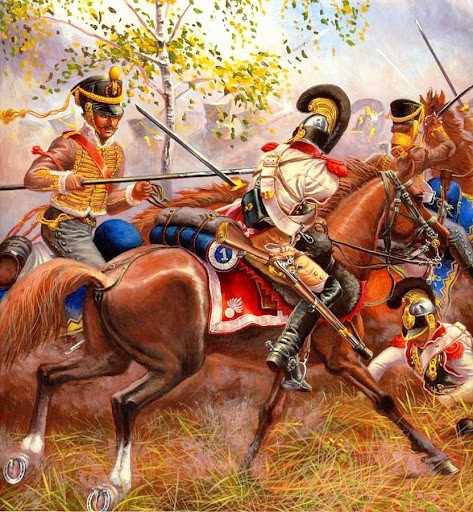 |
Missed Opportunity
This had been
exactly the chance Napoleon had been waiting for. He typically
routed his opponents in these open field battles, but not
today. The battle was a stand off at best.
Napoleon
had been astonished by the bravery of the Russians.
Defending their homeland, the untrained and poorly
armed Russian army had fought with a ferocity that
won Napoleon's grudging approval. These were
the same people Napoleon had once described as
"ignorant, apathetic and blind". Not today.
Today the Russian soldiers had put up one hell of a
fight.
"The
most terrible of all my battles was the one
before Moscow. The French showed themselves to
be worthy of victory, but the Russians showed
themselves worthy of being invincible."
At the end of
the day, the French held the field, but Napoleon didn't feel
victorious.
He was actually dazed himself.
Perhaps
that explains why Napoleon had been
uncharacteristically cautious at this battle.
He had missed the perfect opportunity to cripple the
enemy.
The battle ended with the Russian Army
badly out of position. Their men had fought with
amazing courage, but as usual the tactical skill of the
French had out-maneuvered them. At the very end of the day,
the Russian lines broke and the men ran.
|
|
Ordinarily Napoleon would have
seized this chance to begin the forced pursuit that had
marked the campaigns he had conducted in the past.
However the state of
exhaustion of the French forces made Napoleon hesitate to
send them in pursuit.
|
However, he had
another option. Napoleon's vaunted Imperial Guard was rested and available.
Here Napoleon hesitated as well. He was unsure of
the Russian Army's position. Napoleon worried he might
be sending his most valuable men into a trap.
Normally
Napoleon never hesitated to take a chance if the stakes were
important. But today he blinked. By refusing to
set loose his elite
fighting force, Napoleon lost his singular chance to destroy
the Russian army.
Napoleon did not
know it, but this had been his last chance to save his army.
Napoleon was very grim after this battle. The Russian
army had escaped. It would live to
fight another day.
Meanwhile, although the
French had failed to deliver a fatal knockout punch, the Russians
were despondent. They had failed in their holy mission to
defend Moscow.
At the end of
the day, thousands were dead and no one was happy.
Such is the nature of warfare.
|
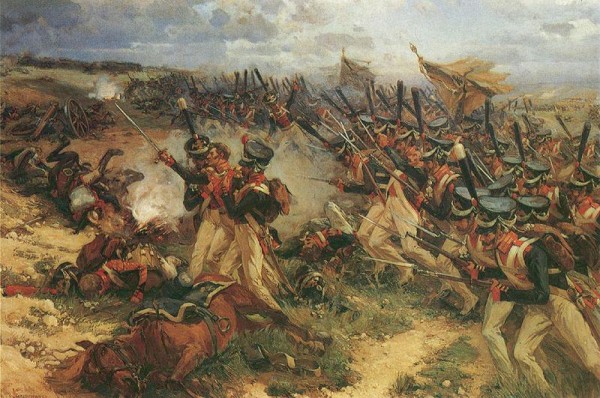 |
In the Russian camp,
Kutuzov knew his army had been lucky to escape.
Kutuzov understood why
Alexander had ordered him to fight, but he also knew that it had
been a great risk. Very few armies had ever survived a head to
head, open field battle with the French.
Although his troops were
miserable at their failure to stop Napoleon, Kutuzov was proud of
them. They had given the superior French force quite a
beating. Very few soldiers could ever make that claim.
However, now it was obvious to
Kutuzov the Russians did not have the strength to prevent the
French from marching onto Moscow.
The city was only 70
miles away. The Russians could not regroup in time to
find an adequate defensive position.
|
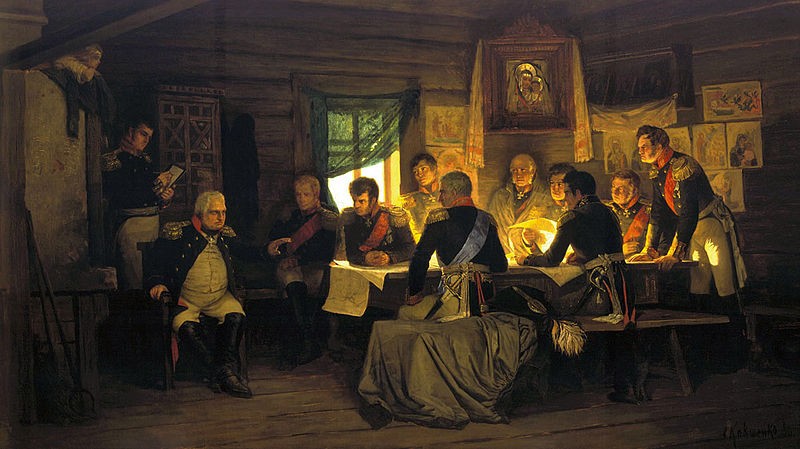 |
The only other
possibility was a last-ditch effort at the walls of Moscow.
However there were no defensive positions prepared. Kutuzov worried
that Alexander would panic and order a hopeless battle.
Kutuzov shook his head in disapproval. No point in losing
lives needlessly.
This defense would not
only likely fail, but it held the real
danger of trapping the Russian army with no escape route.
After a conference at the village of Fili,
Kutuzov fell back on the strategy of his predecessor
Barclay: Withdraw in order to save
the Russian army as long as possible.
It wasn't an easy
decision.
It came at the stiff
price of losing Moscow to the hated enemy.
The Russians had failed. Morale was
at an all-time low.
|
Napoleon realized the path to Moscow was now unblocked.
One week later,
Napoleon rode to the Poklonnaya Hill
about 2 miles from Moscow. There he stopped and
appreciated the splendid view.
He saw Moscow with the numerous domes of churches glaring in
the bright sun and crowned by the fantastic Kremlin,
majestic in its unique beauty. This ancient capital of
Russia had never been conquered. That was about to
end.
After all the
death and suffering, the moment Napoleon and his marshals
had been waiting for such a long time had finally come.
The men were excited. At last!
It had been a
costly campaign. They had crossed the Nieman River
three months earlier with 600,000 men. Now their
numbers had dwindled to half that total thanks to bloody
Borodino, Cossack raids and the
merciless starvation strategy.
Napoleon wasn't
at all happy about the huge losses. Nevertheless he quietly congratulated himself. His brave
gamble at Smolensk a month earlier had paid off. As he
prepared to take possession of the spiritual capital of
Russia, surely now the end was in his grasp.
|
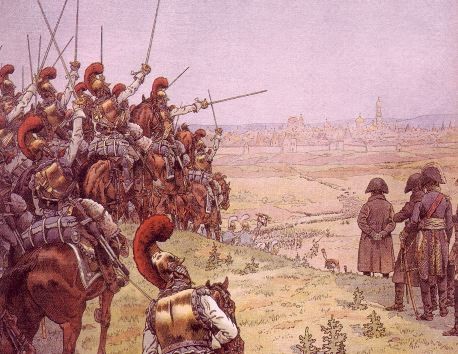 |
|
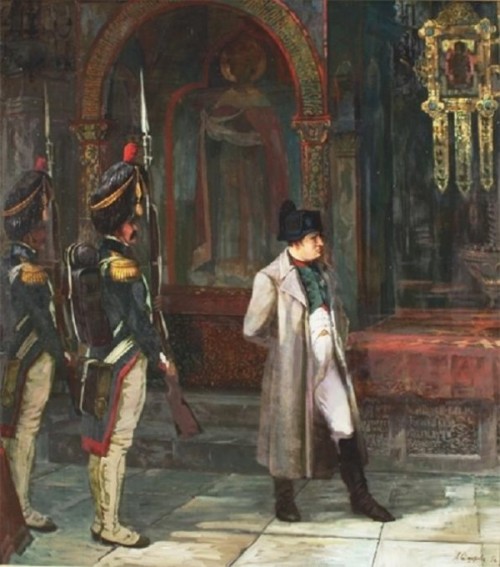
|
Napoleon Enters Moscow
On September 14
at 2 pm Napoleon rode to the Dorogomilovskaya gate and
stopped. He was sure the gates would open and he would be met with
a deputation from Moscow entreating him to spare their
city.
Nobody came out
to greet him. This was odd.
Ordinarily a delegation would greet them and offer proper
housing and food. They would fall at his feet and pray
that he would not hurt anyone
or destroy their city. But not this time.
Napoleon was
secretly disappointed by the lack of custom. He felt it
robbed him of a traditional victory over the Russians after taking
this historically significant city. Who could
possibly understand these uncivilized Russians?
Napoleon hesitated. Fearing it was a trap like the
Trojan Horse,
Napoleon ordered men to go inside and look around. After some time
the officers rode back and reported Moscow was empty.
Napoleon was aghast.
"Moscow
deserted?" Napoleon shouted. "Impossible! Go find
where those coward boyars are hiding and bring them to me!"
But there were
no boyars. All that was left were a handful of lunatics and
criminals who had been freed from asylums and jails by the
retreating Russians. They roamed freely through the streets
along with a handful of wretched poor people who had
lingered behind in search of valuables.
Napoleon gave the order that the men were free to explore
the city and look for food. This was the start of a
day of joyful plundering. The people of Moscow had
taken what they could carry, but many riches had been left
behind. Even better, they found enough food left
behind in the homes to finally enjoy a decent meal.
|
Napoleon could
have cared less that his men were celebrating. He was
deeply
disturbed by
this latest development. The hunger
of his troops caused by the fanatical scorched-earth
strategy of the Russians had unnerved him. Now this
deserted ghost town had left him baffled. What exactly
was the Russian strategy trying to accomplish?
If this was Paris, blood would be flowing in the streets as
the French fought dearly for every niche and corner.
Who hands over their most important city without a struggle?
Napoleon
shrugged. More than
likely Alexander's representatives would come to town the
next day bringing the peace offer. Still, there was
something definitely eerie about this empty city.
The following
day, Napoleon
himself decided to enter. He wandered around aimlessly. Sure enough, all but
a few thousand of the city's 275,000 people were gone.
Moscow had been turned into a ghost town.
Napoleon
rolled his eyes. What were these crazy Russians thinking?
His first orders were to to restore discipline. After 24
hours of plundering Moscow, it was time for the troops to
settle down.
His headquarters were in the Kremlin. Napoleon knew what the
Kremlin meant for Russians. For several hours the emperor
was happy and proud - he was in Moscow, in the Kremlin, in
the palace of the tsars! He thought that the aim of the
campaign was achieved. Here in the magnificent Kremlin, he would
soon sign a
peace treaty with the Russian Emperor on his own conditions.
Napoleon was satisfied at last.
|
The
Burning of Moscow
|
Napoleon retired to a house on the
outskirts of the city for the night, but two hours after
midnight he was awakened. Duroc and
Caulaincourt, his aides, informed
him that a fire had broken out in the city.
As Napoleon rushed to his window, more men brought in
strange reports telling of Russians starting the
fires and stoking the flames.
Alarmed,
Napoleon went
back into town
to the Kremlin. From a safe
distance, he watched the flames continue to grow.
He exclaimed, "What savages! To
annoy me they burn their own history, the works of
centuries!"
Moscow was built
completely of wood taken from the nearby forests. The
fire took hold quickly. The brisk
wind raised huge tongues
of flame to the sky.
Burning
buildings crackled, then tumbled in great protest to the
ground. Shafts of sparks fell
throughout the city
like rain. Unchecked, this fire threatened to destroy this
entire ancient Russian
holy place. But there was little
the French could do to stop the inferno. All the
efforts to put out the fire were without any results.
The heat forced the soldiers to
retreat.
All they could
do was watch. The horror of
fire overwhelmed the French. This was so senseless.
All those beautiful buildings being destroyed! Against
the firelit background, the men could see the smoky
silhouettes of Spasskaya Tower of the Kremlin and the
domes of the St. Basil Cathedral.
Something was on
fire on the Red Square. And behind the St. Basil
Cathedral the view looked like a huge terrible bloody
curtain from the ground to the sky. The Zamoskvorechie,
a Moscow suburb, was completely on fire.
Napoleon shook
his head in continued disbelief. He was hypnotized.
Rich mansions with invaluable works of arts and exquisite
churches perished.
"These
Russians are barbarians! To burn one's city is
insanity. They conduct this bizarre war of extermination.
A demon must possess these people!"
|
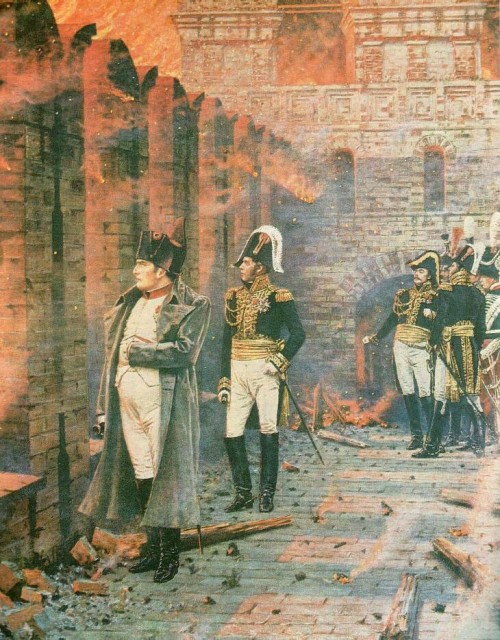 |
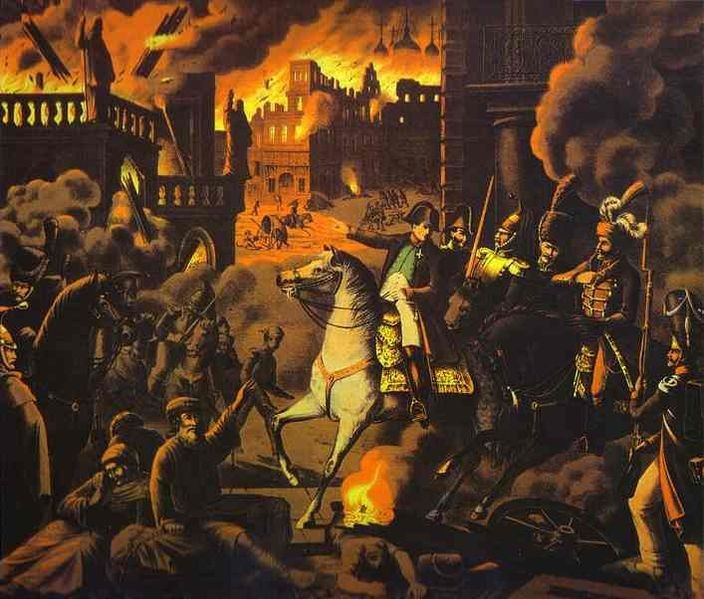 |
Suddenly a fire broke out within
the Kremlin itself. A
Russian military policeman turned
arsonist was caught and
immediately executed.
With the firestorm spreading
in the Kremlin,
Napoleon could see they needed to
leave quickly or face real danger. They left the
Kremlin and went on foot to Arbat Street.
From there
Napoleon and his entourage were forced to flee down
burning streets back towards
Moscow's outskirts.
The burning
streets turned Moscow into something like a
labyrinth of fire. The French took a wrong turn.
As they retraced their steps, they realized one more mistake
like that and they could easily get lost and perish there.
Now the heat
grew so intense they had trouble breathing.
The group of
men began to run for their lives and
narrowly avoided being asphyxiated.
From the
outskirts of the city, they took a vantage point that
allowed them to safely watch the city burn. Napoleon
wondered if
Alexander had a similar vantage point not too far way.
By the time
the flames died down three days later, more than two-thirds
of the city was destroyed.
|
Who Ordered Moscow to Burn?
There is
controversy as to who burned Moscow and why.
Leo Tolstoy, in his classic novel
War and Peace, suggested that
the fire was not deliberately set.
Tolstoy believed it was
all an
accident. Tolstoy
blamed careless French soldiers.
|
Tolstoy's theory
made sense.
Considering how cold the
soldiers were, they surely
made bonfires in a
desperate attempt to escape the bitter Russian winter cold.
Perhaps one unit allowed their fire to get out of control
and didn't have an effective way to stop the burning from
spreading.
Contradicting
Tolstoy's theory, there is a great deal of circumstantial
evidence to suggest Count Rostopchin, the mayor of Moscow, gave orders to have
the Kremlin and major public buildings blown up and
set on fire.
Supposedly Rostopchin had
pleaded with Kutuzov to make a last-ditch stand at the walls
of Moscow. However Kutuzov thought the battle could
backfire and demurred.
Crushed,
Rostopchin then decided the scorched earth policy should be
invoked. He made preparations to have anything that might
have value for the French - food stores, granaries,
warehouses, and cloth stores - to be torched once the city
was evacuated by the Russians. According to the mayor,
his men waited till night, then set fire to the city.
|
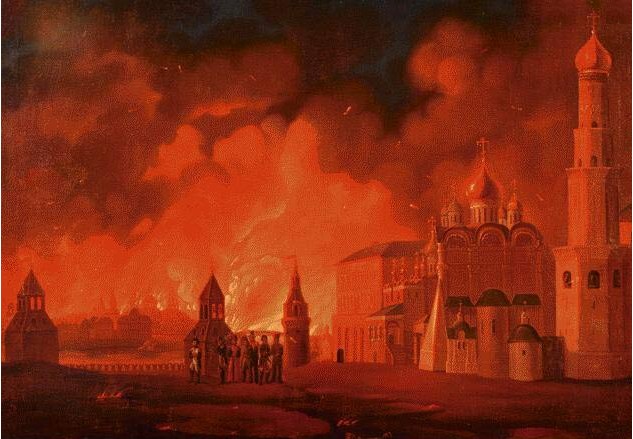 |
There's only one problem.
Rostopchin himself denied giving this order and Rostopchin's
alleged role in the burning has never been completely
confirmed.
The best case
against Rostopchin rests with
the
memoirs of General Armand de Caulaincourt, Napoleon's aide
de camp. Caulaincourt's famous memoir, "With Napoleon
in Russia" was lost for years and finally unearthed after
World War I. It was finally published for the first time in
1933. Here is the
account as it appears in
Wikipedia.
Caulaincourt,
Napoleon's aide de camp, stated that they had been in
Moscow for three days. That evening a small
fire had broken out but was extinguished and 'attributed
to the carelessness of the troops'. Later that evening Coulaincourt was woken by his valet with the news that
'for three quarters of an hour the city has been in
flames'. Fires continued to break out in multiple
separate points.
Incendiarists were arrested and interrogated and
declared that their commanding officer had ordered them
to burn everything. 'Houses had been designated to this
end.' Later on in the same chapter he asserts 'The
existence of inflammable fuses, all made in the same
fashion and placed in different public and private
buildings, is a fact of which I, as many others, had
personal evidence. I saw the fuses on the spot and many
were taken to the Emperor.'
He
goes on to write 'The examination of the police
rank-and-file… all proved that the fire had been
prepared and executed by order of Count Rostopchin'.
Note that Coulaincourt's memoirs did not even appear till
1933, 121 years after Moscow burned. Rostopchin was
blamed for his role in the fire right from the start by a
lot more people than Napoleon's aide de camp.
Mayor Rostopchin was hated
in Russia because everyone in the country believed he was
responsible for burning the city. However, it is
important to note that Mayor Rostopchin spent the rest of
his life denying his role.
Here is
history's best guess. Common sense points to
deliberate sabotage by the Russians. As Caulaincourt
pointed out, "Fires
continued to break out in multiple separate points".
That suggests several men acting in unison. This
explains why the Russians were suspicious of Rostopchin.
Certainly
Tsar Alexander didn't order the burning. He is said to
have wept bitterly at the news. There is no record
that Kutuzov ordered it either. If anyone actually did
order the burning, it was probably Rostopchin. No one
else had the authority.
It is said that Rostopchin was treated bitterly
throughout the rest of his life for his role
in setting the fire. This makes no sense.
Yes,
the burning of Moscow was a supreme sacrifice, but it was a
brilliant sacrifice nonetheless. The burning of Moscow
placed Napoleon in a serious predicament that led directly
to his humiliating Winter Retreat. The burning of
Moscow had transformed the city from a precious bargaining
chip into a trap that would soon vanquish the monster.
Considering the
outcome, you would assume the person who ordered the fire
would go down in history as one of Mother Russia's greatest
heroes.
We may never
know whether the Moscow fire was deliberate or accidental,
but no one can deny its effect on the French army was absolutely crippling.
Whether anyone in the French Army knew it or not, from
this point on they were all doomed.
|
| |
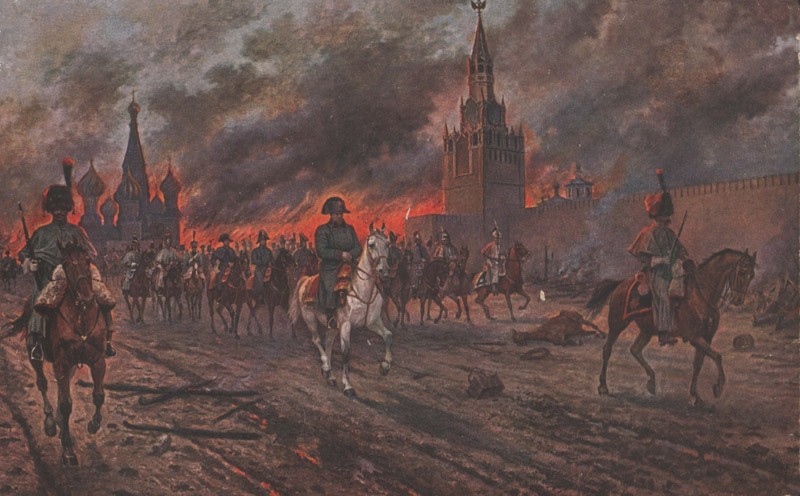 |
The Grim Reaper
Comes Calling
Moscow had been the
best chance for the soldiers to find provisions. Now it was gone.
After the fire, not even a
crumb of bread was left. The fire had removed any chance of
finding food.
The fire left enough buildings left to provide shelter.
But it was cold. The Russian winter was setting in and it was
no ordinary winter. By some cruel fate, it was the worst winter of
the century.
How strange
it was that whenever somebody invaded Russia, the winter that
particular year was especially
savage.
The mystics claim that
in Russia, the Gods of the Russian winter exact their own revenge on
invaders. Perhaps it was these same Gods who burned Moscow...
|
Apparently these terrible winters had happened before. During
the invasions of Swedes and Germans, the winter was also very
savage. There was a story of the 6000 Swedes who died overnight
frozen right in their saddles during 17th century.
Now the Russian Winter
enveloped the French Army. The bitter cold caused
intense suffering. There was absolutely nothing to eat.
Meanwhile Cossack raids 300 miles away
prevented new provisions to be delivered to the troops from supply trains.
The French were even getting low on ammunition.
Kutuzov's
patrols prevented the French from foraging. Every time the
French ventured too far from the walls, a Cossack patrol or snipers
were sure to
inflict casualties. The French were caught in a death trap.
No food, no gun powder,
no shelter, no wine... nothing. The soldiers started eating
dogs, rats and cats. Then they moved on to the horses. Thanks
to the dark magic of Russian winter, the Grim Reaper set up
permanent shop in the French encampment.
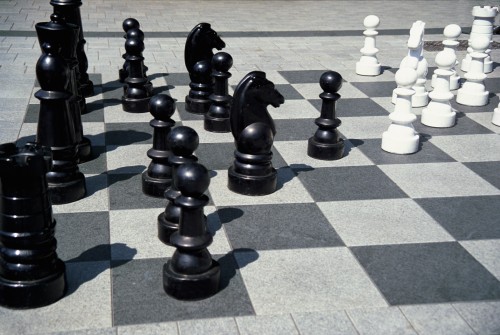 |
Le Grand
Trap
In chess, there is a
move known as a "Sacrifice". What you do is give up a valuable
piece in order to put your opponent in a tougher position. The
loss of Moscow was the ultimate sacrifice. And yet it was the
perfect sacrifice.
Napoleon had taken Moscow for two reasons. One, to find food.
Two, to use Moscow as a bargaining chip to force Alexander to
negotiate. Now, suddenly Napoleon had neither. His men
couldn't eat and he couldn't hold Moscow hostage because it was
gone.
Moscow had been
sacrificed to put Napoleon into the worst trap of his life. What was
he going to do now?
Ask yourself this
question. Would George Washington have been willing to burn down
Boston to trap the redcoats and end the war? If someone
promised him it would guarantee a victory against the
overwhelmingly superior English army, then probably yes.
|
Losing Moscow must
have hurt the Russians terribly, but it practically guaranteed
victory.
In fact, it was such a brilliant move that it is
shame no one knows who to give the credit to. Maybe Tolstoy
was right; maybe the fire really was an accident. After all,
no ordinary human being had both the guts and the authority to do
something this audacious.
Are you a believer in
mysticism? Maybe the unseen Gods that manipulate Fate lit
those fires. If so, you might wonder if this was the horrible
Karma of Napoleon catching up to him. If anyone ever
deserved a bad break, that would be Napoleon.
Strangely, Napoleon just
sat there on the outskirts of Moscow for a month. It was an
awful time for him. Most likely Napoleon spent all that time
pondering how he had ever gotten into this mess and wondering if
there was any way out.
No doubt
Napoleon kicked himself
for not turning back when he had the chance at Smolensk. Why did he
ever decide to march to Moscow?Napoleon shook his head.
Until Moscow burned, this move had made sense. When
he had first entered Moscow, Napoleon had every right to expect a fervent plea for peace from
Tsar Alexander I of Russia. However, the burning of Moscow
changed everything.
What use is a hostage if
the hostage dies?
Napoleon had to admit
that he had never seen this coming.
This Moscow stunt took the
cake. Had his enemies had outfoxed him with that fire or did
they just get lucky?
Who in their right mind burns their most
important city?
As Napoleon stared at
the burned shell of Moscow, he asked himself again why he ever come
to this hell hole in the first place.
The only effective benefit of
capturing Moscow was to add the conquest of the
center of Holy Russia to his resume.
But it had accomplished nothing but get a
lot of his men killed. Napoleon had not lost a single battle,
but here he was a sitting duck. This campaign was a complete
failure if Alexander refused to come to
the bargaining table.
But Alexander remained
silent. Maybe Napoleon had
underestimated Alexander. The old Alexander
of Tilsit was fearful and easily manipulated. The old
Alexander would have sued for peace after Borodino or the capture of Moscow.
But the new Alexander was someone who operated by some sort of extreme logic
that made no sense to Napoleon.
Napoleon's world was
characterized
by rulers who preferred to
sign pieces of paper to end a conflict. To
avoid needless death and destruction, perfumed royalty simply traded
territory with the stroke of a feather and ink.
Not these Russians.
These Russians had defied all civilized
logic of the day. Certainly
a leader might give up something small
to gain freedom, but no
one burns their capital to do it!!
That is too extreme, too big of a sacrifice.
Napoleon concluded it
took the mind of a fanatic to
burn a capital city. This was a decision born of lunacy, not
sound judgment.
Nor was it the work of a gentleman to burn
his
own crops, uproot his own people, devastate
his own capital and
refuse to do battle
while the people of his country suffered and died.
This strategy was not the work of a
gentleman, but rather the doings of a coward.
Napoleon shook his head
in disgust. Not for the first time Napoleon wondered if it was
the centuries of Mongol domination that had caused such insanity.
Someone had taught these people to think like barbarians!
Even their
leader had turned into a madman.
Napoleon's Plea
As the days passed, no
offer of peace appeared. So Napoleon wrote a letter.
"My lord Brother Alexander. Beautiful, magical Moscow exists no
more. How could you consign to destruction the loveliest city in the
world, a city that has taken hundreds of years to build?"
Alexander replied with a
short message. He said that
the burning of Moscow had "illuminated his soul".
Alexander refused to
negotiate with Napoleon.
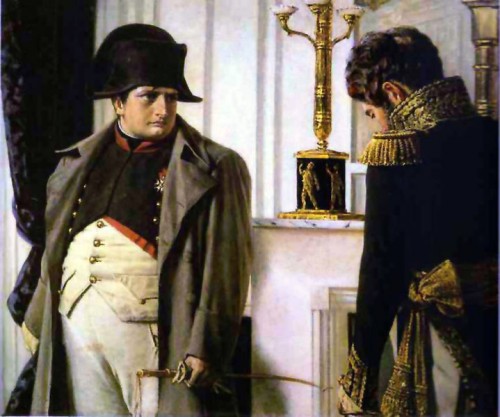 |
As the days passed,
Napoleon became increasingly desperate. This was ridiculous!
By all conventions of war, his army had just taken Russia's capital
city and conquered Russia! Why did not Alexander beg him for
peace? Did Alexander not understand how deadly his army still
was?
Alexander was in no mood
to negotiate. Now that he had lost Moscow, he didn't care
about anything. Napoleon be damned. Let him occupy
Moscow just as long as wanted. Napoleon was at best a prisoner
in the same city he had conquered. What more damage could
Napoleon do to Russia now?
Alexander hated Napoleon with a burning passion. Napoleon had
played him for a fool at Tilset. Let Napoleon burn in hell.
Alexander's silence
drove Napoleon nuts. The waiting was unbearable.
Napoleon had to do something. At last he decided to ask for
peace himself. He ordered General Lauriston to go to the
Russian headquarters and sue for peace. As Lauriston departed,
Napoleon is said to have shouted, "I
need peace! Get it for me at all costs!"
Kutuzov received
Lauriston, but shrugged his shoulders. "Your General has made war on
my country without provocation. I owe him nothing. If he wants
peace, tell him to leave my country and go home."
|
|
The Winter Retreat
|
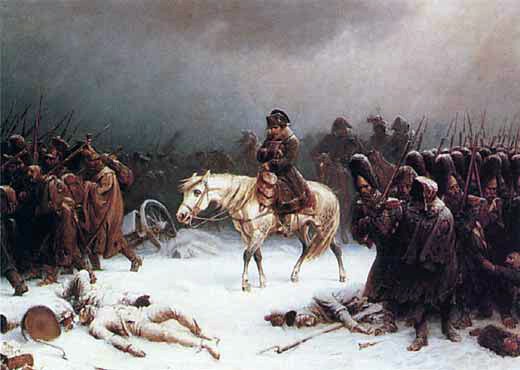 |
Napoleon got the message. There would be no mercy given.
Napoleon had gotten himself into this mess. Now he would have
to get out of it.
After waiting a month
for the surrender that never came, Napoleon was forced to lead his
starving army out of the ruined city. He knew his men were in
serious danger. Napoleon had one hope. If he could break
through Kutuzov's blockade and head south to the Ukraine, he would
probably be able to find food there and save his army.
The French left Moscow
on October 19 in the dead of Winter. The Russians knew the
French were on the move. Kutuzov sent a detachment to
intercept. A battle took place on October 24 at Maloyaroslavets.
They intercepted the French and
fierce fighting began. During the course of the engagement the
town changed hands no fewer than 8 times. The French had
'fought like lions'. As well they should. Their backs
were against the wall. Their very
survival depended on it.
Marshal Kutuzov arrived
and decided against a pitched battle with the Grand Army the next
day. He preferred to retire instead to a well-prepared line of
defense nearby at Kaluga.
|
The
French casualties were about 5,000 killed, while the Russians lost
6,000. But the French weren't celebrating. As usual, the
Russians had lost the battle, but continued to win the war. The French had won a tough victory on the day only to realize with
sinking hearts that their preferred path to the Ukraine through
Kaluga was far too well-defended.
The French had a choice.
They could attempt a bitter, deadly fight against the firmly
entrenched enemy at Kaluga or they could take another path that
would not require a fight.
Napoleon chose the
unopposed direction. However, he knew full well what Kutuzov
was doing. Kutuzov had just forced Napoleon to retreat through
Smolensk. This meant retracing the same ravaged 600 mile route
that he had taken to Moscow during the summer. Napoleon had
desperately hoped to avoid this route. He knew full well there was
not a single drop of food to be had in this direction.
|
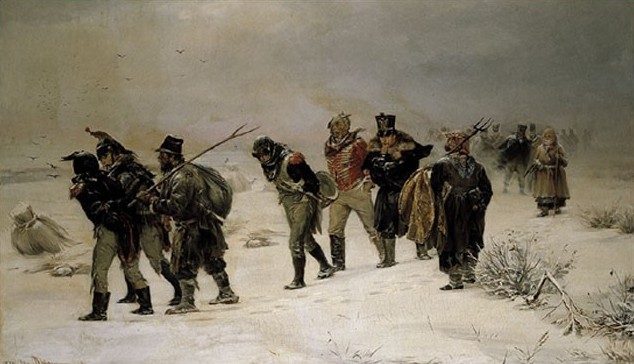 |
|
The Cold
Cruel Russian Winter
The Death March had
begun.
During the disastrous
retreat, Napoleon's army suffered continual harassment from the
merciless Russian army.
The conditions were
unbelievably harsh. Shelter was rarely found. Stalked by
subzero temperatures, hunger, and the deadly lances of the Cossacks,
the decimated army limped along.
The agony the French
suffered must have been unbearable. Still, they had shown no
mercy when they held the upper hand.
|
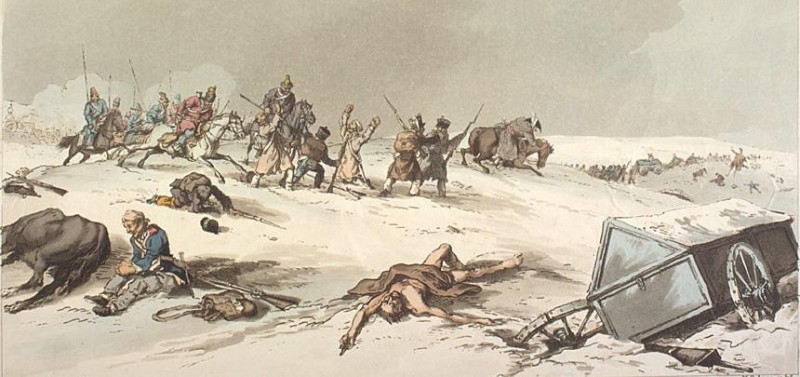 |
There was certainly no reason for
the Russians to behave any differently.
Throughout the Death March, the Russians never
let up. They inflicted further defeats on the
Grande Armée at Vyazma, Krasnoi, and Polotsk.
The French were
so low on supplies they were afraid to shoot back unless they had
someone directly in their gunsight.
You can't imagine it
could possibly get worse, but it did. Disease struck the army.
Soldiers began to desert for fear of getting sick. The
Cossacks on horseback would see their tracks in the snow,
track them down and execute them.
|
Horses died right and
left. They became instant meals. Sometimes the men ate
horsemeat raw if they were hungry enough.
The cruel Gods of the
Russian Winter had one more horrible trick up their sleeve. When
the Retreat began, it was too cold at first. The
French endured a
bone-chilling frost that few had experienced before.
The cold was utterly agonizing. The temperatures were known to drop to 20
degrees below zero.
First to die were the weak.
Too
exhausted to walk, they collapsed and died.
As the little food supplies
they had ran out, the strong got weaker and they too began to die.
Men would just drop all
day long. Their corpses lined the road. The bodies
stayed right where they fell until spring.
|
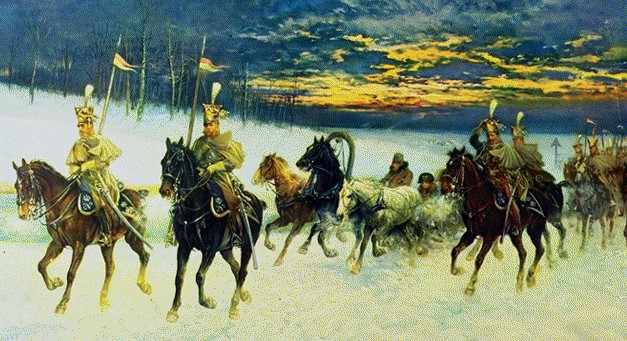 |
Once
again the weather played another evil trick.
Impossibly, this time it got even
colder than before. One bitter night a
thousand men were said to have died in their sleep overcome
by exhaustion, exposure
and misery.
But then the weather
mysteriously changed. There was a warm spell which thawed the
frozen roads — slowing down the march even more. It
was actually easier to travel on the roads in winter because the
surface was hard. Now that the snow melted, the
heavily rutted
roads became quagmires
of mud. Every problem the French had
encountered on the way to Moscow they had to face again on the
retreat.
Streams that were once frozen
and easy to cross became difficult to
cross. If the waters had to be waded, imagine how cold and miserable the men were
in their wet clothes after crossing. Men died simply from
crossing a stream. Unable to dry off, they began to shiver in
the unrelenting cold so hard they couldn't even continue walking.
|
Berezina River
All the bridges
had been destroyed the previous summer. The
warming trend meant rivers that could have been crossed on ice
now needed bridges.
One such river was the
Berezina.
The
Berezina
River was not far from the border with French-occupied Lithuania.
The Berezina was the last river the French had to cross to
get to safety.
Napoleon's plan was to cross the
river and head for Poland. The Russians thought otherwise. This was a great spot
to trap his army and destroy
it.
The recent thaw worked
greatly to the Russian's advantage. The warm weather ruined
Napoleon's original plan to
cross the frozen river while it was iced over.
|
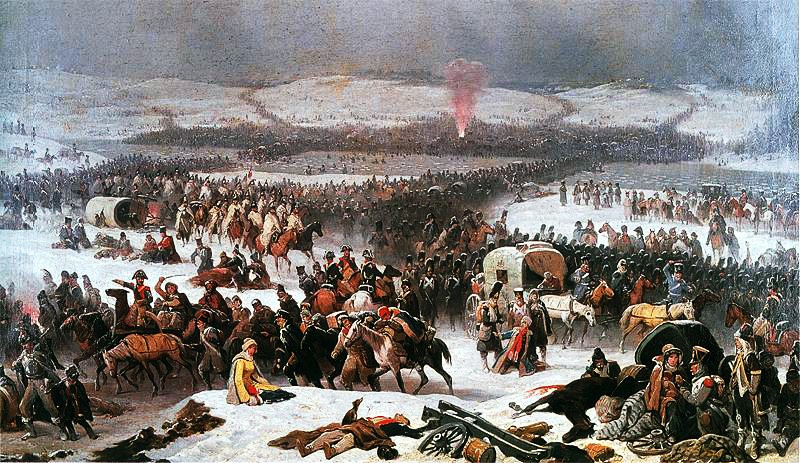 |
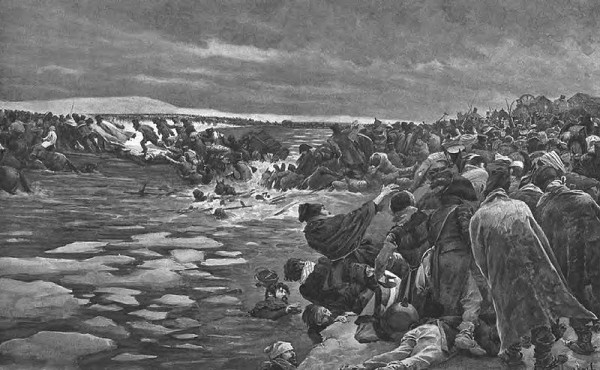 |
In late November, Napoleon's engineers did their best to create a
temporary crossing at the Berezina.
Over a four day period, Napoleon struggled to get his men across.
Then the Russians showed
up. The soldiers
waiting to cross panicked when they were
attacked by the Russians. In their
desperate attempt to cross the bridge, it
broke. Many tried to wade cross the
semi-frozen river only to die of frostbite later.
The rear guard suffered
terrible losses trying to provide cover for the desperate men.
An estimated 25,000
soldiers died or were captured. It was a
crushing final blow.
Since then "Bérézina" has
become used in French as a synonym for
"disaster". Or "catastrophe" if you prefer.
It was over.
Napoleon's Winter Death March had come to its final bitter conclusion.
|
| |
|
The Death
Toll
|
By the time the army crossed into Poland in early December,
somewhere between 95,000
and 110,000 exhausted, tattered
soldiers were all that remained of the
600,000 proud
soldiers who had crossed the Nieman
River five
months before.
Out of those 100,000 men
who managed to cross the Berezina River in November, only 27,000 of
those soldiers were still fit to fight.
380,000 men were dead or missing and
100,000 were captured.
All told, the French
lost about 400,000 men with most casualties occurring on the way
home. The Russians lost 200,000. Of course, that doesn't
include the massive loss of life among the Russian civilians.
Please keep in mind that
all these numbers are just someone's best guess. Records were
very imprecise back in those days.
One of the curiosities
of the Russian Campaign is that Napoleon's invasion of Russia marked
one of the few times when he had actually attacked with a larger force.
Napoleon had won most of his previous famous victories despite being
outnumbered.
Charles Joseph Minard
was a French civil engineer in the 1800s. He drew up a fascinating chart
which depicted the massive loss of French lives in a very unusual
way. If you can bear to look, Minard expressed
the French losses by using a narrowing line.
|
 |
|
Napoleon's
Comeback
|
Readers who are
unfamiliar with the saga of Napoleon will be shocked to discover
that the Corsican gangster would continue to wreak death and
destruction across Europe for three more years.
For an ordinary person,
Russia should have been the final straw. Out of an original force of 600,000, only
110,000 frost-bitten and half starved survivors stumbled back
across the European continent into
France.
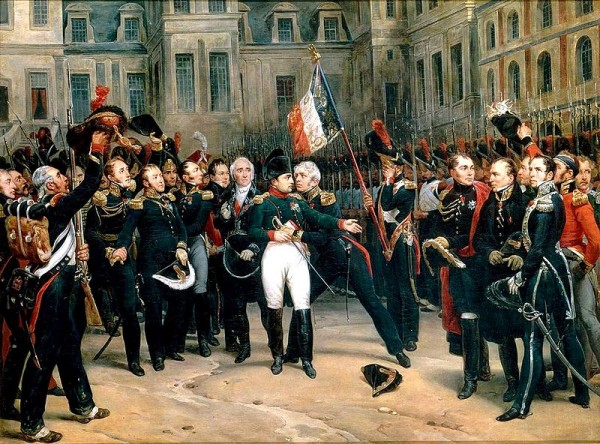 |
Sad to say,
the
devastating licking Napoleon took from the
Russians was only the first stake in the heart of
the vampire.
His army was shattered and morale was
pitiful,
but Napoleon still breathed.
Despite the Russian's best efforts,
Napoleon was not
killed or captured in the
retreat. He lived to fight another day.
Napoleon had
foreseen what the loss in Russia would
mean to his reputation, so he fled back to
France quickly before word of the disaster became widespread. This clever ploy
allowed him to
raise another army.
Communications
were so slow in those days that Napoleon had weeks to operate before
the story of Russia caught up to him.
After the humiliation
suffered by Napoleon at the hands of Russians, one would expect a
person of pride to withdraw somewhere and lick his wounds. Not
Napoleon. He got right back to the business of waging war.
To the unpleasant surprise of all Europe, Napoleon soon rose from
the dead thanks to his quick return to France.
Say what you
will about Napoleon, but there can be no doubt he inspired
fierce loyalty. There were men who would follow him to
very gates of Hell... and probably did.
|
Was the amazing Russian
upset victory just a nasty bump in the road for Napoleon?
Hardly. Napoleon's defeat in Russia proved to be the
decisive turning point of the Napoleonic
Wars. The Russian campaign
may not have finished Napoleon off, but it emboldened the rest of
subjugated Europe to rise as one and take a stand.
Now that Napoleon was
back from the dead, he frowned when he discovered the mood had
changed in Europe. The other countries had all grown a
backbone.
If Russia
could do it, maybe they could too.
A good example of the
new order of things was Austria. Once a great empire in its
own right, Austria had been decimated by Napoleon's occupation
starting with the Battle of Austerlitz in 1807. Metternich,
Austria's famous statesman, had no choice but to seek detente with
France.
On the eve of Napoleon's
advance into Russia,
Metternich was forced to choose sides. His heart
was with Russia, but his practical side was with France.
Austria could not take another punitive action by Napoleon.
With a strong belief that the much
weakened Austrian state should avoid
another invasion by France in any Franco-Russian war,
Metternich turned away the diplomatic
advances of Tsar Alexander. Then Metternich
concluded an alliance with Napoleon in
March 1812.
Imagine how Alexander
felt when he saw Austrian troops enter Russia under French control.
Considering that
Metternich preferred Russia and that Russia had fought right beside
Austria at Austerlitz against Napoleon, Metternich's cynical move to
side with France shows just how much Napoleon had Europe under his
thumb.
However,
with France's devastating
defeat in Russia
two years later,
now Metternich saw his chance to right the wrong. Austria
quickly changed sides, realigned with Prussia and Russia, and went
after Napoleon with a vengeance.
Metternich began to take the actions that
would take Austria out of his French alliance with secret
negotiations. Sensing this
and urged on by Prussian nationalists and Russian commanders, German
nationalists revolted in the French Confederation of the Rhine and Prussia.
The decisive German campaign likely could not have occurred without
the message the defeat in Russia sent to the rest of Europe.
|
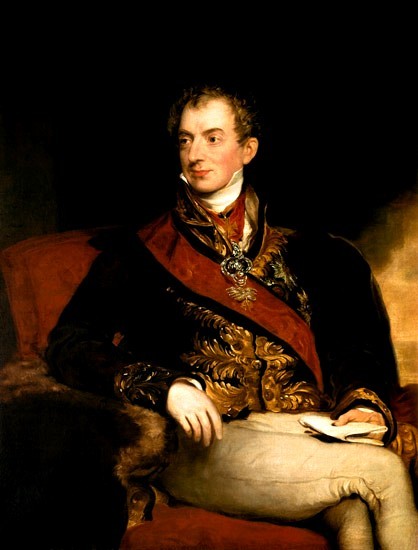 |
The Coalition of
nations allied against Napoleon was overwhelming.
Seeing an
opportunity in Napoleon's historic defeat, Prussia, Sweden, Austria,
and a number of German states re-entered the war.
They were joined by Russian forces pursuing the dictator.
In addition, England took the field. Europe was determined to
put an end to this monster.
Even with practically
every European power now lined up against him, Napoleon still
managed an impressive comeback.
|
Napoleon raised an army of
around 400,000 French troops supported by a quarter of a million
troops from France's remaining allies to contest control of Germany in a
new campaign.
It would
take two years of constant fighting to finally subdue Napoleon.
Despite being outnumbered,
Napoleon was hard to bring down. When the French general
won a huge victory at the Battle of
Dresden in 1813, he seemed to be on the verge of
reasserting his old dominance. Europe was terrified.
It was not until the decisive Battle of
Nations in Leipzig (October 16–19, 1813)
that he was finally defeated.
After Leipzig, Napoleon
was forced to retreat back to France with the Coalition forces right
on his heels.
|
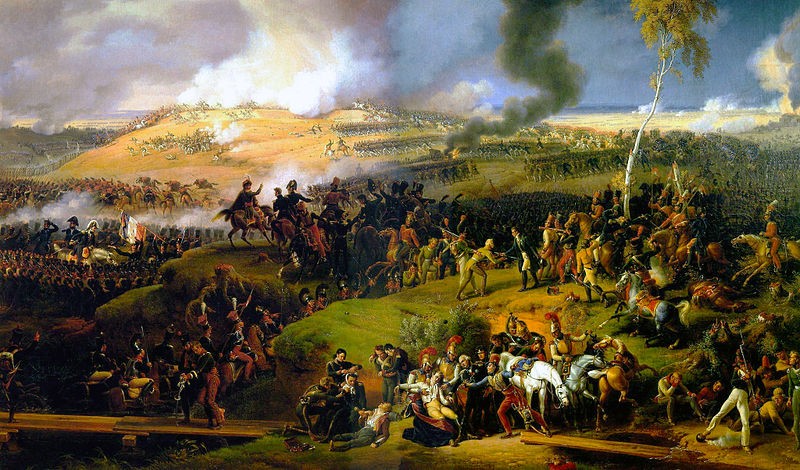 |
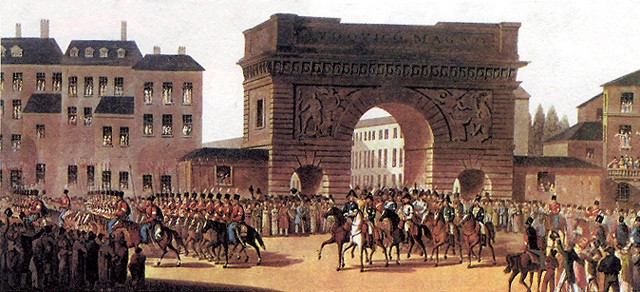 |
Napoleon
no longer had the troops to stop the
Coalition's invasion of France. The Russians and their
allies had decided to follow Napoleon to his lair.
During the fighting in
France, Napoleon did still manage to inflict heavy losses
with a series of
minor military victories.
However
the far larger Allied armies
were determined not to quit this time. They
drove towards Paris in 1814.
After a series of
pitched battles, the overwhelmingly outnumbered French finally
surrendered. This picture shows the victorious Russian army entering
Paris.
Napoleon was exiled to
the island of Elba in April 1814. He would escape and rise again in
1815. This time it took England's Duke of Wellington to subdue
the man in the famous battle of Waterloo. Upon his banishment to St.
Helena, Napoleon finally departed the world scene.
|
The Russian campaign had revealed that
Napoleon was not invincible. In
particular, his inability to adjust his usual "live off the land"
tactics to the Russian strategy when he still had the chance was
crippling.
Another major mistake
was his refusal to
quit his campaign in Spain while trying to campaign in Russia.
Historian F.G. Hourtoulle had this to say: "One does not make
war on two fronts, especially so far apart."
In trying to have both
victories, he gave up any chance at either.
The Spanish campaign also came to a negative
conclusion.
When it came to light
that Napoleon had made many terrible errors
in this campaign, the humiliating defeat put an end to his reputation as an
undefeated military genius.
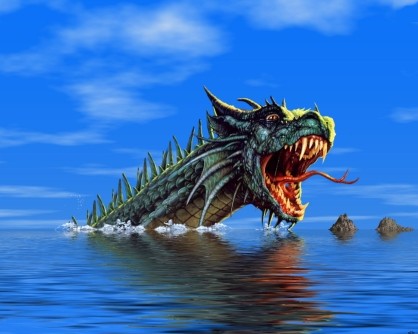 |
For some reason, there
is a tendency on the part of some to cut Napoleon some slack.
Why this is, no one can be sure. Perhaps one reason would be a
begrudging admiration for his tenacity, political skill, and
military prowess.
No one can deny Napoleon
was an evil scourge on mankind. The overall death toll
attributed to Napoleon has been pegged at 5 to 7 million (civilian
and military).
Yet, oddly enough, his
reputation is nowhere near as bad as that of Hitler. In contrast
with the genocide of Hitler, Napoleon fares
well. Perhaps this anomaly can be explained by the fact that
Napoleon had a sense of style and Hitler didn't.
In addition to his charm
and manners, by and large he treated his vanquished foes with
decency. While most people view Hitler as pure evil, many see
Napoleon as a misguided genius who took the wrong path after a good
start. Power corrupts.
Nevertheless, nothing
can excuse Napoleon's actions. Countless innocent people died
needlessly due to his outsized ambition and ego. Napoleon was
a monster.
|
Aftermath in
Russia
We all know that the
Russian military didn't actually beat Napoleon. Some of the
credit goes to the Gods of the Russian Winter and the unknown
saboteur who burned Moscow, the
master sacrifice that would one day lead to the death of the serpent.
Therefore, it is
difficult to say who were the true heroes of the Russian victory.
If anyone deserves the credit, it would have to be Barclay de Tolly,
the much maligned architect of the controversial scorched earth
strategy.
Barclay was blamed for
the loss of Smolensk, but it was Pyotr Bagration's disregard for
Barclay's authority that got the Russians into the mess in the first
place. However, it was Barclay who took the fall. He was
relieved of his command by Alexander after the loss.
Barclay accepted the
demotion as gracefully as possible. Three weeks later Barclay's
men fought brilliantly at the pivotal battle of Borodin.
Immediately following
Borodin, it was Barclay who convinced Kutuzov to cede Moscow to
Napoleon. This move became the trap that finally ensnared
Napoleon.
While Napoleon spun his
wheels for a month in Moscow, the personality conflicts continued in
the Russian high command. Insulted over the misunderstanding
of his actions and feeling he had been treated unjustly, Barclay de
Tolly submitted a report to Alexander asking for permission to leave
the army. He was granted leave. However less than a
year later Barclay was recalled to resume his duties as Commander when
Kutuzov took ill.
After the war, once
people realized the true extent of his contributions, Barclay de
Tolly was
eventually recognized as a great Russian hero. However
Barclay's name is barely known outside of Russia.
Unappreciated in his own country, disrespected by his peers, and
unknown in the Western world, it seems strange that the Duke of
Wellington is given all the credit for defeating Napoleon while the
identity of the man who made it all possible lingers in obscurity.
|
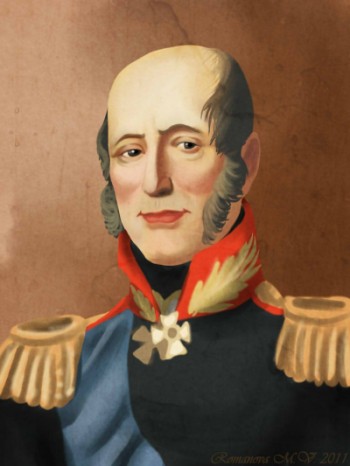 |
Rather than Barclay, it
was Mikhail Kutuzov who
was heralded as the Russian general who beat Napoleon. A
cursory examination of his role shows that Kutuzov got very lucky
when Moscow burned down. Now that Napoleon was trapped,
Kutuzov rode to glory on this fortunate turn of events while Barclay got all
the blame for the suffering involved in the scorched earth madness.
Who said life is fair?
Sadly, Kutuzov didn't get to stick around to receive
his tributes.
The stress of the war took a deep toll on his health. He died in
1813 while in pursuit of the French army across Europe.
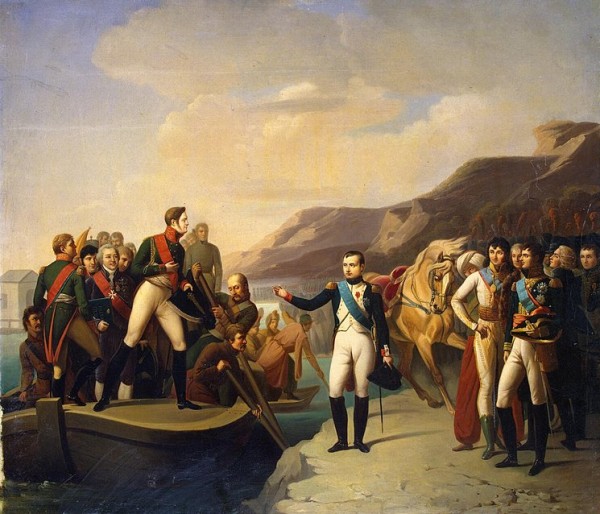 |
The Campaign of 1812 was
the turning point of Alexander's life.
Emperor Alexander
had been taken for a ride at Tilsit in 1807. The inexperienced
young man had fallen under the spell of the silver-tongued general.
Slowly but surely over
the course of the next few years, Alexander had the blinders removed
from his eyes. Noticing that Napoleon's actions didn't match
his words, Alexander came to the correct conclusion that Napoleon
was keeping Russia neutralized with his insincerity until he was
ready to attack. Once Alexander realized how easily Napoleon had
manipulated him with false promises, he took a stand.
While it is true that
Russia paid dearly for the Tsar's stand on principles, ultimately
Alexander may have had no choice. Who is to say that Napoleon
would not have attacked Russia anyway when he was good and ready?
Besides England, Russia
was the last obstacle in Napoleon's way. If Napoleon had
succeeded in conquering Russia military or neutralizing it with threats
and cajolery, who knows how long England could have resisted?
England was having
problems of its own. It was fighting a war with Napoleon in
Spain and fighting America in the War of 1812 (a war caused in large
part by tensions created by Napoleon's policies). If Russia had
fallen, England was in deep trouble.
|
One reason the study of
Napoleon remains so fascinating is the clever way that the French
leader managed to force countries like Austria, Germany, Italy and
Prussia to bend to his will. No one dared step out of line. Napoleon
was engaged in a real-life campaign of systematic conquest that
resembled the board game Risk.
In Risk, every
time you conquer a territory, you get an extra army on your next
turn. Napoleon played the same game... but for real.
Each time he defeated a
country, Napoleon ordered the country to contribute men to his army.
Then Napoleon would go against the next country twice as strong.
By the time Napoleon reached Russia, he had completely shattered the
European balance of power that had kept the various countries in
check for centuries.
By the time Napoleon
decided to attack Russia, his
Grande Armée had grown to
preposterous dimensions. His force of 600,000 men consisted of
troops not just from France, but troops from Prussia, Italy,
Germany, and Austria as well. Russia's army was terribly
outnumbered and outcoached. It was one country against
five and the five had the best general.
What betting man would have given Russia
any chance at all?
Alexander is a hero
because his defiance moved up Napoleon's timetable. He provoked
Napoleon into taking on Russia before Napoleon had settled his problems in
Spain. Distracted and unprepared, Napoleon
uncharacteristically fell into a trap that cost him his Empire.
Alexander's brave move
probably saved Europe. People make mistakes when forced to move too fast.
Therefore Tsar Alexander
I gets high marks for his role in ending the tyranny of Napoleon.
Alexander deserves much credit because he took on a
dangerous man and stood up to him.
How many other men had the guts to stand up to a bully like
Napoleon? History already has the answer for that. Very
few.
After the
War
Despite Alexander's
much-acclaimed role as the savior of Europe, Alexander did not fare
well after the victory.
The horrors of the war -
seeing the peasants die of starvation, seeing Napoleon carve the
Russian armies up with ease, seeing Smolensk and Moscow go up in
smoke - was more than he could bear. The senseless violence,
suffering, and needless destruction all weighed on his soul.
Alexander turned to
religion and mysticism. At the burning of
Moscow, Alexander made the odd declaration that his soul had found illumination.
Alexander said he had received a divine revelation that it was his
sacred duty to become the peacemaker of Europe.
However, now that his
mission was fulfilled, Alexander was overcome by a lingering
depression he could not seem to shake. Alexander turned inward.
He embarked on a spiritual quest for the final twelve years of life.
There are hints in
Alexander's biography that he was a troubled man. Unlike
Napoleon or Alexander's predecessor Peter the Great, tough guys born
with thick skins, Alexander took every loss personally. His
sensitive nature caused him to assume much of the responsibility.
The resulting guilt disturbed a mind never too well balanced in the first place.
Sadly, he left his good wife Louise for a mistress in 1799.
In an odd turn of events, Alexander left his mistress and returned to his
wife nineteen years later in 1818. He and Louise became very
close from that point on.
Alexander's life came to
a sudden end in 1825. He rushed to his wife's side
when Louise was diagnosed with typhus. Alexander caught the same
disease and perished soon after. His biography doesn't say
whether he found the mystical answers he was looking for.
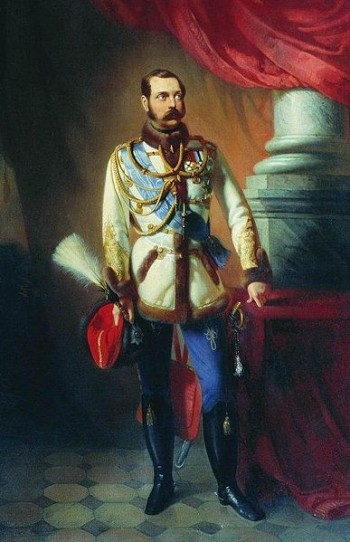 |
The End of
the Romanov Line
For Russia, the
consequences
of winning the 1812 war with France were strange.
The
term "Patriotic War"
became a symbol for the
country's newfound national identity.
For the first time ever, the nobility and the peasants alike both
began to care for Mother Russia. Even the people in far off
Siberia began to feel affection for the country thanks to the
remarkable victory by a serious underdog over the world's major
superpower.
This powerful new love for
the homeland would have
great effect on Russian patriotism throughout the
remainder of the 19th century.
Unfortunately, the
indirect result of the patriotic movement of Russians was a strong
desire for the modernization of the country.
Thanks to the terrible
mistreatment of the serfs through many centuries, there was a
tremendous buildup of bitterness that worked like an acid upon the
Russian soul. Over the centuries, this bitterness had created
a vast reservoir of pent-up pressure. This pressure was so
extreme it can be compared to the same sort of
pressure buildup that precedes a massive earthquake. This
tension would have to be released sooner or later.
In 1861, Alexander II,
the son of Nicholas I (younger brother and successor to Alexander I), took a
major step to solve the problem by freeing the serfs.
By a
strange coincidence, Alexander II's decision to free the serfs in
1861 came at almost the exact same time as Lincoln's decision to
free the slaves in 1863.
Thanks to "Alexander the
Liberator", there was much rejoicing among the lowly serfs.
|
However, Alexander II's move backfired in a certain way.
The nobility immediately scrambled for ways to keep the freed serfs
from straying too far. They sold them land under outrageous
terms. The uneducated serfs almost immediately found
themselves in debt
that guaranteed more servitude. That just added to their
frustration.
Now that they had some
freedom, the working class said that freeing the serfs wasn't
enough. Now how about treating these people fairly? How about
laws to protect the weak and downtrodden? What about
education? And medical treatment?
They demanded more reforms IMMEDIATELY.
Big problem. Everyone
knows that nothing in Russia changes fast unless Peter the Great
threatens torture.
Alexander II tried to
pass more reforms, but the Duma, Russia's legislature,
dragged its heels. Peter the Great would have simply chopped
off a few heads to accelerate things, but Alexander II tried to work within the system.
He didn't get very far.
The working class didn't
understand that the Tsar was doing the best he could. They had no
patience left. A plot to take his life formed.
Alexander II died an
unusually horrible death in 1881. As his carriage crossed a
bridge, a giant bomb exploded. His reinforced carriage saved
him, but innocent bystanders screamed in pain. When Alexander got out
of the carriage to see if he could help the wounded, a second
assassin saw an opportunity and threw his bomb at him.
In the explosion, both
legs were severed. The poor man bled to death right there on the
sidewalk. He was said to have died in great agony.
Two good men - Lincoln
and Alexander - had done the right thing for their country and both
men died
senseless, terrible deaths at the hands of ignorant people.
This assassination was
the absolute worst thing that could have happened to Russia. All Russian people were
filled with horror and revulsion at this barbaric act. They
felt the exact same way most American Northerners did when Lincoln
was killed. They demanded justice and revenge.
|
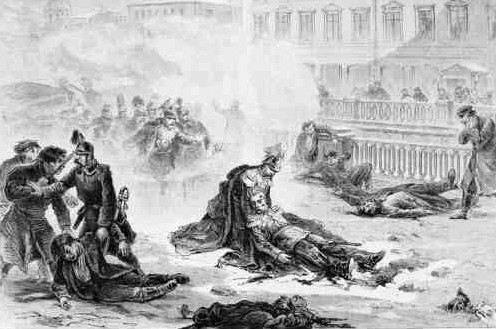 |
The similar paths of
America and Russia now took different turns.
While America
overcame the death of Lincoln to move slowly back towards unity after the Civil War, Russian society
ruptured.
|
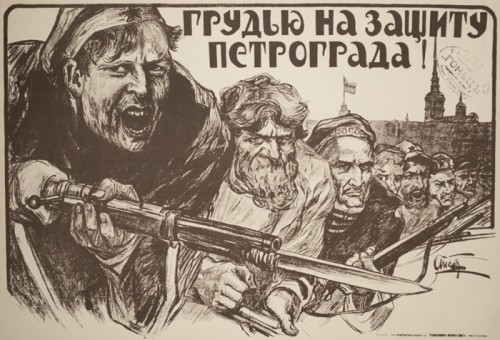 |
It turned out the
well-organized assassins were members of the "People's Will"
movement. This was a secret faction of disgruntled working
class members who were bitter that Alexander had not reformed Russia fast
enough to suit them.
Once the ruling class
discovered the working class identity of the assassins, the
shockwave of Alexander's terrible death created a massive backlash
that stopped the reform movement in its tracks.
The
legislature passed a series of laws that began a new era of harsh
repression. A tide of misery spread throughout the land.
This in turn led to more
resentment of the nobility and the Tsar. Ultimately the schism
in society just kept getting worse. It led to a series
of minor
revolutions that
culminated with the explosive
Russian Revolution of
1917.
The crowd that
supplanted the Tsar as Russia's new leaders were a mean and
merciless bunch.
|
Their brutal, cold-blooded execution
of Tsar Nicholas and Empress Alexandra as well as their popular children in
1918 left a horrible stigma on the Russian conscience that remains to this
day.
Perhaps the centuries of
built-up hatred for the ruling class required some sort of
blood-letting similar to the guillotine death of Louis XVI and Marie
Antoinette. Perhaps if the murderers had simply stopped at
shooting the Tsar, people could understand. But the murder by
firing squad of the wife and the innocent children was barbaric and
cruel in a way the civilized world could not tolerate.
The senseless murder
marked the end of the Romanov line. It also removed any
sympathy for the new Russian leaders in the eyes of the world.
One totalitarian regime
had replaced another. Some say all the regime change
accomplished was change the cold thick boot atop
Russia's throat.
Meanwhile, the majority
of Russia's populace would continue to lead lives of desperation just like they had since the invasion of the Mongols 700
years earlier. Russia has never been a
stranger to cruelty and murder.
There are said
to be ghosts hiding in the snows and the forests wherever you go.
The chilling red stain of Romanov blood never seems to disappear.
And the steely Russian skies go on forever...
|
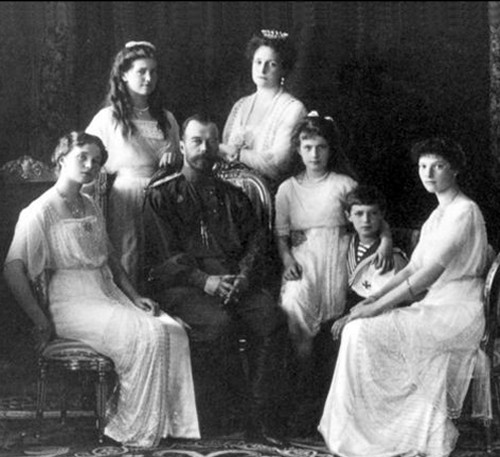 |
|
A Note From Rick Archer: This
concludes my Story of Russia. As
you can see, I have chosen to abbreviate the tragedy of the
Romanov execution and the brutal Russian Revolution. In
addition I bypassed the Twentieth Century developments such
as the 20 million victims of Joseph Stalin, the Cold War and
the Communist Regime. Trust me, much can be read about these subjects
elsewhere.
One thing to
keep in mind is that I cannot assure the Reader of the
accuracy of everything I have written. I am a Travel
Writer who wrote this story while researching our upcoming
visit to Russia in August 2012. I do all my research on the Internet.
This means my story's accuracy is dependent on
the work of anonymous people I have never met and cannot vouch for.
In other words, my
word is only as good as the word of the person whose story
pops up on Page One or Page Two of Google.
If you trust
Wikipedia, then you can relax.
Each story starts
with the Wikipedia version, the modern font of all
knowledge. From there I nose around for additional
sources. Although I can't say that my writing is
"scholarly", I promise you that I didn't make anything
up.
I hope you have
enjoyed my recap of Russia History. I found
the story of the Russia to be quite riveting. I
hope you agree.
Rick Archer
February 2012
rick@ssqq.com
|
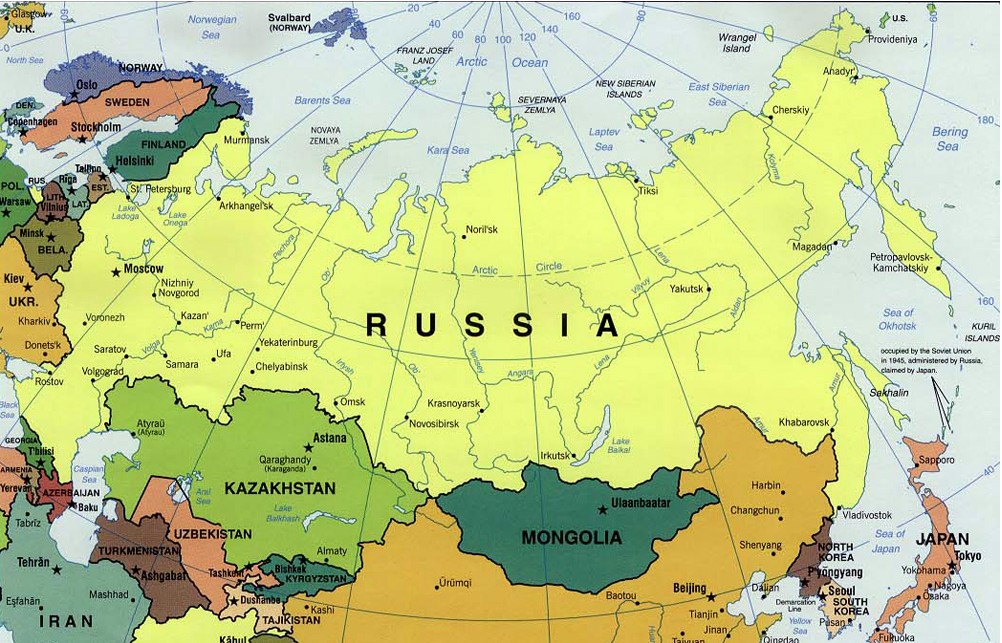
|